Blog
Accounting for Stock In Trade

Accounting for Stock In Trade
''Stock in trade,'' often referred to as ''inventory'' in accounting and business terminology, encompasses movable and immovable property and materials used in day-to-day business operations.
Accurate identification and tracking of stock in trade are vital for precise financial reporting, particularly for the balance sheet, as it significantly affects a company's financial health and performance.
Valuation of Stock in Trade
There are two primary methods for valuing stock in trade:
(a) Acquisition Cost
This includes:
i. Direct expenses related to the purchase of goods intended for resale or materials and components used in the production of finished goods.
ii. Other direct expenses explicitly associated with acquiring stock or bringing it to its current condition and location (e.g., customs duties, direct labor, transport, and packaging).
iii. A portion of any overhead expenses properly attributable to manufacturing goods (e.g., office rent, utility charges, stationery, and maintenance services).
(b) Cost Methods
There are three primary cost methods:
i. First-In, First-Out (FIFO): Assumes the earliest items in inventory are the first to be sold or used, and their costs are allocated to the cost of goods sold.
ii. Last-In, First-Out (LIFO): Assumes the most recent items in inventory are the first to be sold or used, and their costs are allocated to the cost of goods sold. Note that LIFO is not allowed under International Financial Reporting Standards (IFRS) and is unacceptable for income tax purposes.
iii. Weighted Average Cost (WAC): Calculates an average cost for the entire inventory based on the total cost of all units in stock and the total number of units in stock.
Summary
In conclusion, properly valuing stock in trade is critical for financial reporting and business performance. Understanding the cost methods can help businesses make informed decisions about their inventory management, financial health, and compliance with accounting standards.
Visit Us
-
Wisma KTP, 53 Jalan Molek 1/8, Taman Molek, 81100 Johor Bahru
-
Wisma THK, 41, Jalan Molek 1/8, Taman Molek, 81100 Johor Bahru
KTP (Audit, Tax, Advisory)
An approved audit firm and licensed tax firm operating under the KTP group based in Johor Bahru providing audit, tax planning, advisory and compliance services to clients
-
Website www.ktp.com.my
-
Instagram https://bit.ly/3jZuZuI
-
Linkedin https://bit.ly/3sapf4l
-
Telegram http://bit.ly/3ptmlpn
THK (Secretarial, Bookkeeping, Payroll, Advisory)
A licensed secretarial firm in Johor Bahru providing fast reliable incorporation, secretarial services, corporate compliance services, outsourcing bookkeeping, and payroll services to clients
-
Website www.thks.com.my
-
Facebook https://bit.ly/3nQ98rs
KTP Lifestyle
An internal community for our colleagues on work and leisure.
-
Tiktok http://bit.ly/3u9LR6Q
-
Youtube http://bit.ly/3ppmjyE
-
Facebook http://bit.ly/3ateoMz
-
Instagram https://bit.ly/3jZpKLo
KTP Career
An external job community on vacancies in Johor Bahru for interns, graduates & experienced candidates.
-
Instagram https://bit.ly/3u2PxHg
-
Facebook http://bit.ly/3rPxz9o
Capital Expenditure vs Capital Revenue
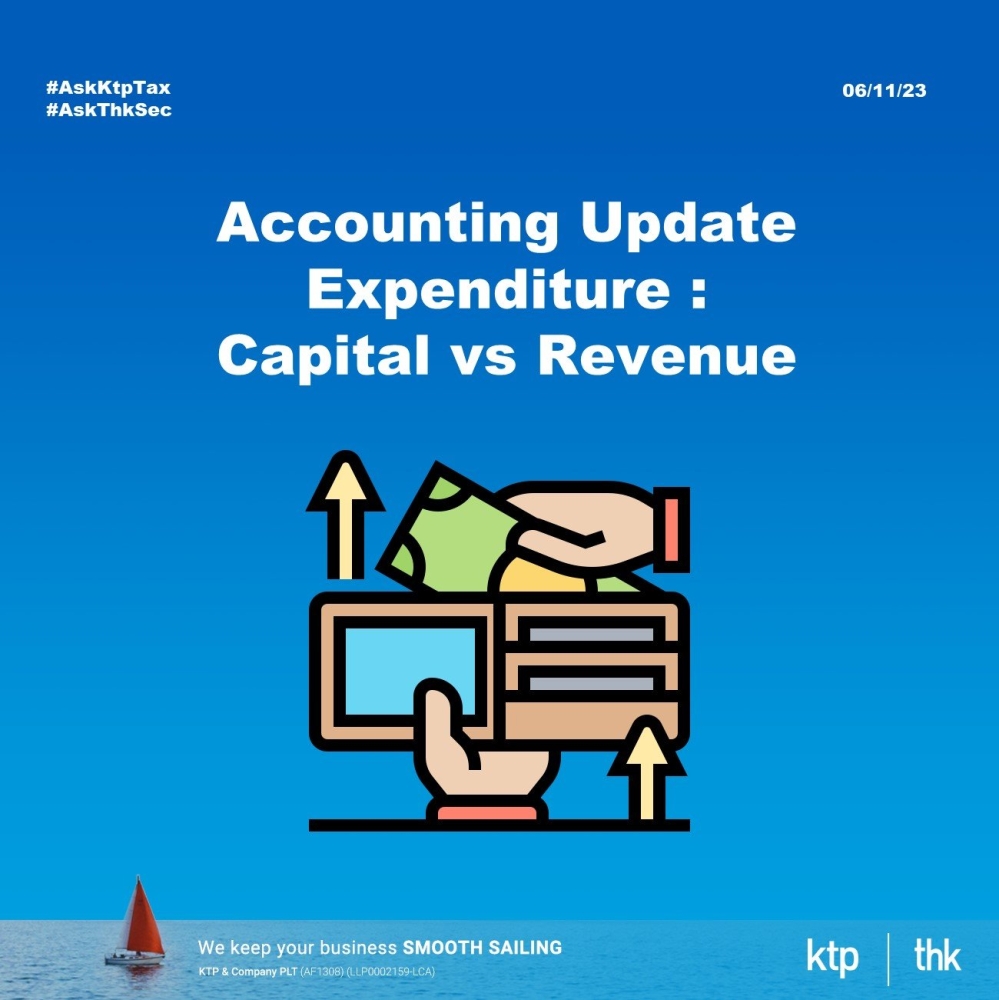
Capital Expenditure vs Capital Revenue
The Difference between Capital Expenditure and Capital Revenue
Capital expenditure refers to the funds invested in acquiring or enhancing long-term assets, while capital revenue represents income generated from the sale of capital assets or other sources contributing to the capital of a business.
1. Purpose of Funds
Expenditure – Funds invested in long-term assets or development in the business. These expenses are intended to provide long-term benefits to the company.
Revenue – Funds spent on day-to-day operations of the business, covering routine expenses necessary to keep the business running.
2. Nature of Expense
Expenditure – Typically non-recurring in nature.
Revenue – Generally recurring in nature.
3. Designation
Expenditure – Often referred to as Development Expenditure. These investments are aimed at improving the company's capacity or capabilities.
Revenue – Commonly known as Non-Development Expenditure because it does not involve the development or acquisition of new assets.
4. Accounting Treatment
Expenditure – Capitalized on the balance sheet and depreciated over time. The cost is spread out over its useful life through depreciation, which means the expense is recognized gradually over time to match the asset's value consumption.
Revenue – Recorded as income in the profit and loss statement. It contributes to the company's total income for the period in which it is earned.
5. Financial Statements
Expenditure – Affects the balance sheet by increasing assets and the income statement through depreciation.
Revenue – Impacts on the income statement as a source of income.
6. Examples
Expenditure – Plant & Machinery, Buildings
Revenue – Raw Materials
Conclusion
Understanding the distinction between capital expenditure and capital revenue is essential for effective financial management in any business. Capital expenditure involves investments in long-term assets, which impact the balance sheet and long-term strategic planning.
Visit Us
-
Wisma KTP, 53 Jalan Molek 1/8, Taman Molek, 81100 Johor Bahru
-
Wisma THK, 41, Jalan Molek 1/8, Taman Molek, 81100 Johor Bahru
KTP (Audit, Tax, Advisory)
An approved audit firm and licensed tax firm operating under the KTP group based in Johor Bahru providing audit, tax planning, advisory and compliance services to clients
-
Website www.ktp.com.my
-
Instagram https://bit.ly/3jZuZuI
-
Linkedin https://bit.ly/3sapf4l
-
Telegram http://bit.ly/3ptmlpn
THK (Secretarial, Bookkeeping, Payroll, Advisory)
A licensed secretarial firm in Johor Bahru providing fast reliable incorporation, secretarial services, corporate compliance services, outsourcing bookkeeping, and payroll services to clients
-
Website www.thks.com.my
-
Facebook https://bit.ly/3nQ98rs
KTP Lifestyle
An internal community for our colleagues on work and leisure.
-
Tiktok http://bit.ly/3u9LR6Q
-
Youtube http://bit.ly/3ppmjyE
-
Facebook http://bit.ly/3ateoMz
-
Instagram https://bit.ly/3jZpKLo
KTP Career
An external job community on vacancies in Johor Bahru for interns, graduates & experienced candidates.
-
Instagram https://bit.ly/3u2PxHg
-
Facebook http://bit.ly/3rPxz9o
What are The 2 Types of Shares?
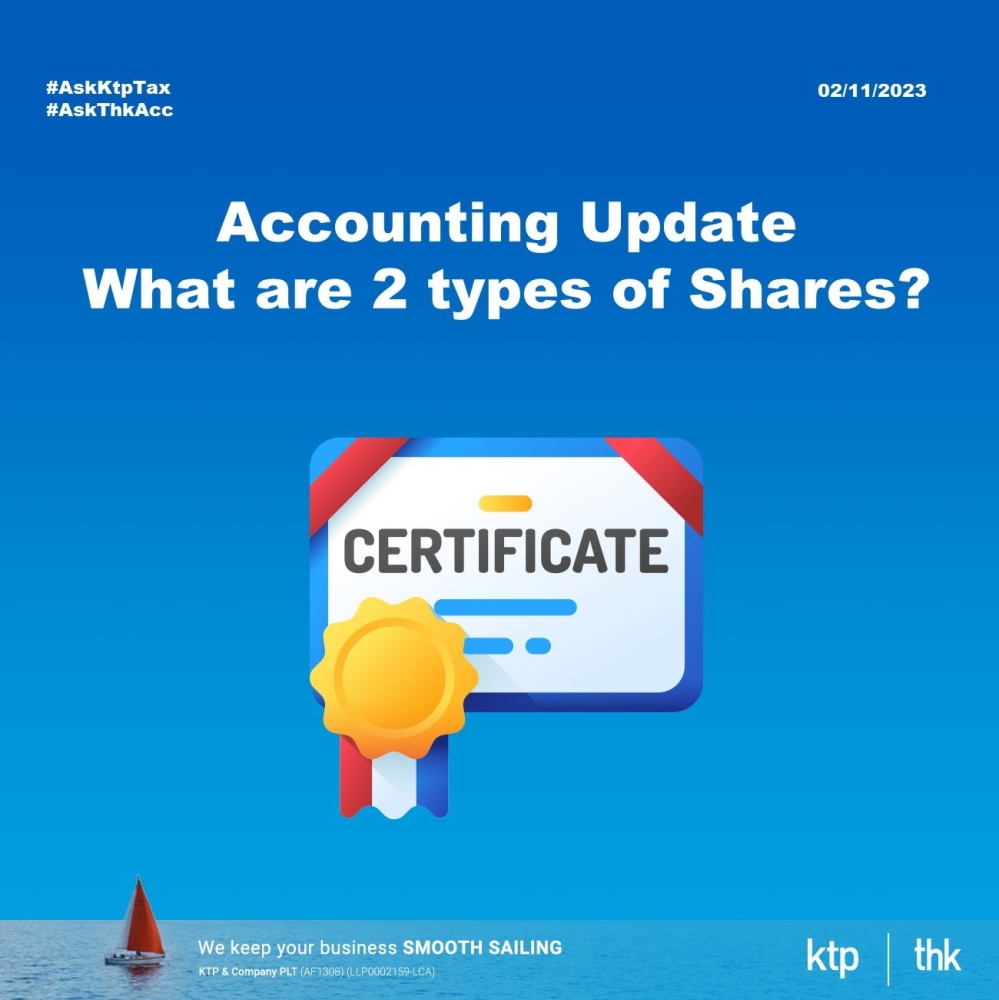
What are The 2 Types of Shares?
We delve into the world of shares, exploring their intricate definitions, classifications, and the impact they have on financial and accounting practices, with a special focus on International Accounting Standard (IAS) 32.
1. Shares Defined under Accounting Standards
Shares represent units of ownership in a company, but their classification under IAS 32 is vital. Shares are considered equity when there's no contractual obligation to transfer cash or other financial assets. Furthermore, when such shares are subsequently sold or disposed of, they can trigger income tax or real property gain tax (RPGT) implications.
2. Two Types of Shares
Our discussion uncovers two primary types of shares:
• Para 3(b) Shares under IFRS 2 - Shares Based Payment
• Real Property Company (RPC) shares
3. Definition of Para 3(b) shares under IFRS 2 - Shares Based Payment
Para 3(b) shares refer to the exchange of assets for shares in a controlled company.
4. Definition of RPC Shares
RPC shares, on the other hand, pertain to shares in a real property company. A company qualifies as an RPC if it meets two conditions: it's a controlled company and owns real property or RPC shares that collectively account for at least 75% of total tangible assets (TTA).
5. When Shares Qualify as Both Para 3(b) and RPC Shares
Intriguingly, there are instances where shares meet the criteria for both Para 3(b) and RPC shares. In such scenarios, the priority lies with Para 3(b). Consequently, these shares won't be categorized as RPC shares, even if the company transitions into an RPC or already is one during the circumstances described in Para 3(b).
Key Summary
In conclusion, shares are the embodiment of ownership in a company and hold significant importance in financial and accounting contexts. Whether they fall under the umbrella of equity or have tax implications can significantly influence financial reporting and strategic decisions for both investors and companies.
Furthermore, the distinction between Para 3(b) and RPC shares plays a pivotal role in understanding a company's standing concerning real property ownership and associated tax considerations.
Visit Us
-
Wisma KTP, 53 Jalan Molek 1/8, Taman Molek, 81100 Johor Bahru
-
Wisma THK, 41, Jalan Molek 1/8, Taman Molek, 81100 Johor Bahru
KTP (Audit, Tax, Advisory)
An approved audit firm and licensed tax firm operating under the KTP group based in Johor Bahru providing audit, tax planning, advisory and compliance services to clients
-
Website www.ktp.com.my
-
Instagram https://bit.ly/3jZuZuI
-
Linkedin https://bit.ly/3sapf4l
-
Telegram http://bit.ly/3ptmlpn
THK (Secretarial, Bookkeeping, Payroll, Advisory)
A licensed secretarial firm in Johor Bahru providing fast reliable incorporation, secretarial services, corporate compliance services, outsourcing bookkeeping, and payroll services to clients
-
Website www.thks.com.my
-
Facebook https://bit.ly/3nQ98rs
KTP Lifestyle
An internal community for our colleagues on work and leisure.
-
Tiktok http://bit.ly/3u9LR6Q
-
Youtube http://bit.ly/3ppmjyE
-
Facebook http://bit.ly/3ateoMz
-
Instagram https://bit.ly/3jZpKLo
KTP Career
An external job community on vacancies in Johor Bahru for interns, graduates & experienced candidates.
-
Instagram https://bit.ly/3u2PxHg
-
Facebook http://bit.ly/3rPxz9o
{Tax Update} IRBM e-Invoice Guideline 2.1
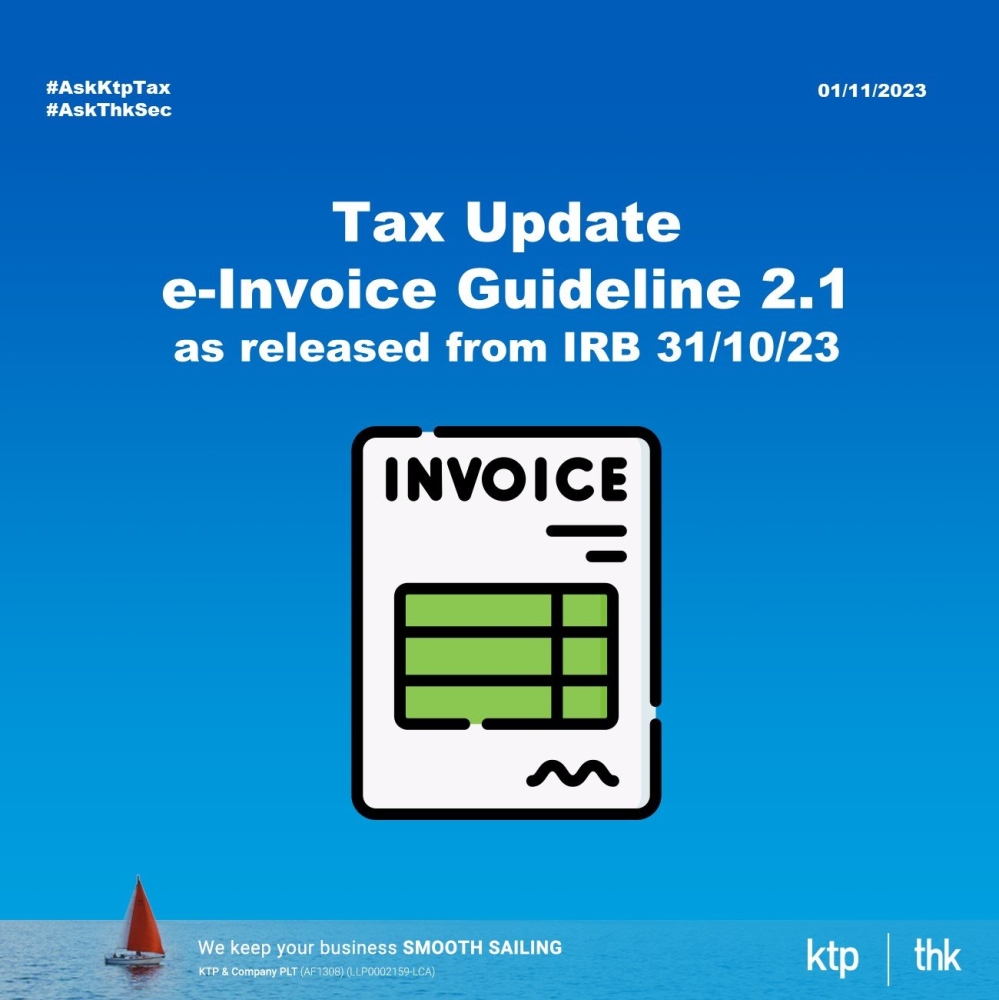
{Tax Update} e-Invoice Guideline 2.1
Latest Development on e-Invoice
The Inland Revenue Board (IRB) has issued updated e-Invoice Guidelines, including:
-
e-Invoice Guideline (version 2.1)
-
e-Invoice Specific Guideline (version 1.1)
Key updates in the guidelines: e-Invoice Guideline (version 2.1):
-
Removed references to non-business transactions between individuals.
-
Revised implementation timeline:
-
1 August 2024 - Mandatory for taxpayers with an annual turnover/income exceeding RM100 million.
-
1 January 2025 - Mandatory for taxpayers with an annual turnover/income between RM25 million and RM100 million.
-
1 July 2025 - Mandatory for all other taxpayer categories.
-
Key updates e-Invoice Specific Guideline (version 1.1):
-
Requires service tax amount inclusion in self-billed e-Invoices for imported taxable services.
-
Extends the deadline for issuing e-Invoices for foreign income received in Malaysia from the same month to the end of the following month.
Reference to Past Blog on e-Invoice
-
e-Invoice Guideline 2.0 https://www.ktp.com.my/blog/tax-update-e-invoice-guideline-2/12oct23
-
Transition Challenges and Strategies https://www.ktp.com.my/blog/e-invoicing-malaysia-transition-challenges-and-strategies/17aug23
-
The Workflow https://www.ktp.com.my/blog/e-invoicing-malaysia-the-workflow
-
Are You Ready https://www.ktp.com.my/blog/e-invoicing-malaysia-are-you-ready/10aug23
-
The Coverage https://www.ktp.com.my/blog/e-invoicing-malaysia-coverage/3aug23
-
The Timeline https://www.ktp.com.my/blog/e-invoicing-malaysia-timeline/2aug23
Source
Guidelines are accessible on IRB's website: www.hasil.gov.my (Home > e-Invoice)
IRB e-Invoice version 2.0 https://www.hasil.gov.my/media/nofmzbk1/irbm-e-invoice-guideline-version-20.pdf
Visit Us
-
Wisma KTP, 53 Jalan Molek 1/8, Taman Molek, 81100 Johor Bahru
-
Wisma THK, 41, Jalan Molek 1/8, Taman Molek, 81100 Johor Bahru
KTP (Audit, Tax, Advisory)
An approved audit firm and licensed tax firm operating under the KTP group based in Johor Bahru providing audit, tax planning, advisory and compliance services to clients
-
Website www.ktp.com.my
-
Instagram https://bit.ly/3jZuZuI
-
Linkedin https://bit.ly/3sapf4l
-
Telegram http://bit.ly/3ptmlpn
THK (Secretarial, Bookkeeping, Payroll, Advisory)
A licensed secretarial firm in Johor Bahru providing fast reliable incorporation, secretarial services, corporate compliance services, outsourcing bookkeeping, and payroll services to clients
-
Website www.thks.com.my
-
Facebook https://bit.ly/3nQ98rs
KTP Lifestyle
An internal community for our colleagues on work and leisure.
-
Tiktok http://bit.ly/3u9LR6Q
-
Youtube http://bit.ly/3ppmjyE
-
Facebook http://bit.ly/3ateoMz
-
Instagram https://bit.ly/3jZpKLo
KTP Career
An external job community on vacancies in Johor Bahru for interns, graduates & experienced candidates.
-
Instagram https://bit.ly/3u2PxHg
-
Facebook http://bit.ly/3rPxz9o
Cost Classification
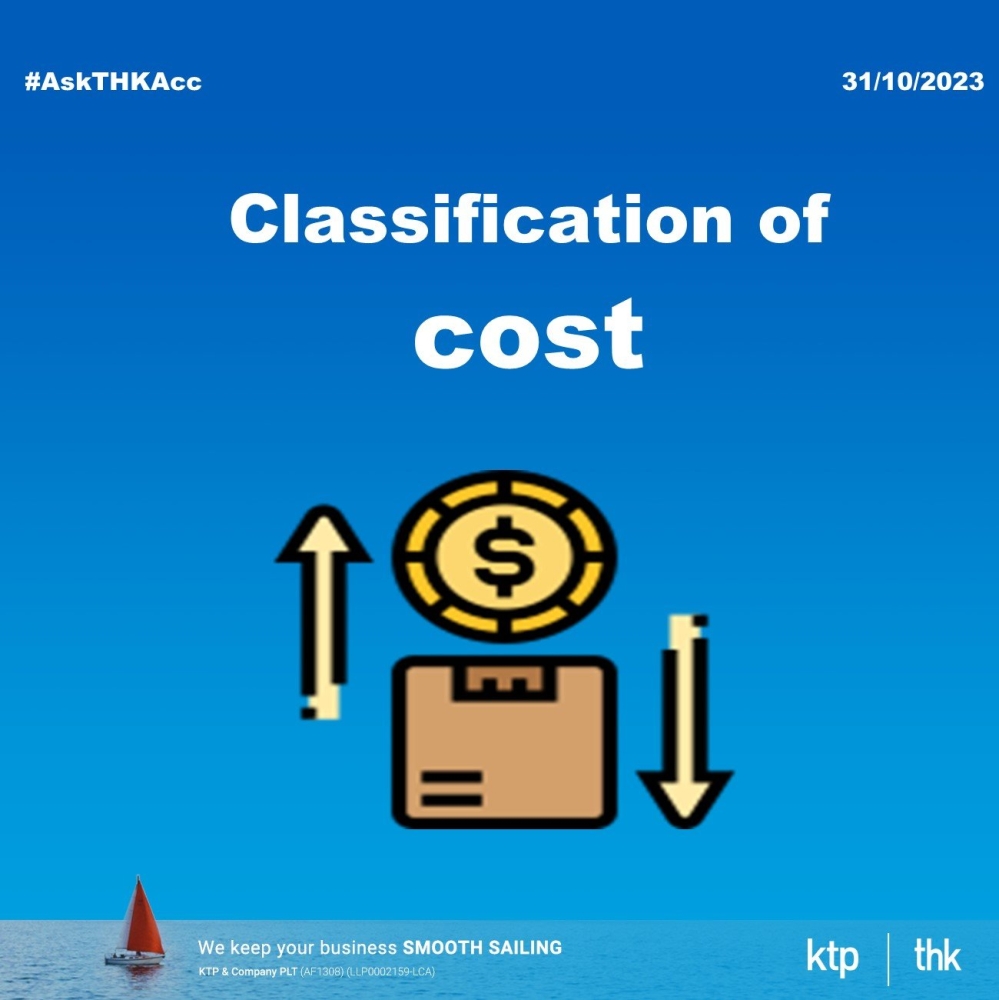
Cost Classification and its types
Cost classification is the process of categorizing various expenses incurred by a business or organization into specific groups or categories based on their nature, function, behavior, or other relevant criteria. This classification helps in analyzing and managing costs more effectively, making informed decisions, and preparing financial statements.
Cost classification according to behavior
Cost classification according to behavior refers to costs that are observed through their behavior on production of units produced. This type of cost can consist of various components, including:
a. Fixed Cost
b. Variable cost
c. Mixed Cost
Fixed Cost
Fixed cost is an expense that does not change when sales or production volumes increase or decrease. Examples include factory rental, depreciation expenses of factory building, transportation, and so on.
Characteristics of Fixed Costs:
a. Stability: Fixed costs remain the same regardless of whether a business produces one unit or a thousand units of a product. They provide a stable foundation for a company's cost structure.
b. Time-Based: Fixed costs are typically considered on a monthly or yearly basis. For example, if a business pays a monthly rent of $1,000 for its office space, that $1,000 remains constant each month as long as the lease terms do not change.
c. Non-Production Dependent: These costs are not tied to production or sales activities. Even if production comes to a halt or sales decrease, fixed costs persist.
Variable Cost
Variable cost is an expense that changes in proportion to production units or activity units. Examples include direct raw materials, direct labor, sales commission and so on.
Characteristics of Variable Costs:
a. Direct Relationship: Variable costs have a direct and linear relationship with production or sales. If a business doubles its production, its variable costs will roughly double as well.
b. Per-Unit Basis: Variable costs are typically expressed on a per-unit basis. For instance, the cost of raw materials per unit or the direct labor cost per unit produced.
c. Production-Dependent: These costs are directly tied to production activities. As more units are produced, more resources (and costs) are required.
Mixed Cost
Mixed cost is a cost that contains both fixed costs and variable costs. Examples include utilities, rent, salaries, landline telephone bill and so on.
Characteristics of Mixed Costs:
a. Combination of Fixed and Variable Elements: Mixed costs have both a fixed portion and a variable portion. The fixed portion remains constant over a certain range, while the variable portion changes with production or activity levels.
b. Step-Like Behavior: Mixed costs often exhibit a step-like behavior, where they remain constant within a certain range and then abruptly increase when production or activity exceeds that range.
c. Non-Linear Relationship: The relationship between mixed costs and production or activity is not linear. This means that the variable portion of mixed costs does not change at a constant rate.
In conclusion, cost classification is a vital accounting process that involves categorizing expenses within a business or organization based on various criteria, including their behavior. The behavior-based cost classification, in particular, is crucial for understanding how costs relate to production or activity levels.
Visit Us
-
Wisma KTP, 53 Jalan Molek 1/8, Taman Molek, 81100 Johor Bahru
-
Wisma THK, 41, Jalan Molek 1/8, Taman Molek, 81100 Johor Bahru
KTP (Audit, Tax, Advisory)
An approved audit firm and licensed tax firm operating under the KTP group based in Johor Bahru providing audit, tax planning, advisory and compliance services to clients
-
Website www.ktp.com.my
-
Instagram https://bit.ly/3jZuZuI
-
Linkedin https://bit.ly/3sapf4l
-
Telegram http://bit.ly/3ptmlpn
THK (Secretarial, Bookkeeping, Payroll, Advisory)
A licensed secretarial firm in Johor Bahru providing fast reliable incorporation, secretarial services, corporate compliance services, outsourcing bookkeeping, and payroll services to clients
-
Website www.thks.com.my
-
Facebook https://bit.ly/3nQ98rs
KTP Lifestyle
An internal community for our colleagues on work and leisure.
-
Tiktok http://bit.ly/3u9LR6Q
-
Youtube http://bit.ly/3ppmjyE
-
Facebook http://bit.ly/3ateoMz
-
Instagram https://bit.ly/3jZpKLo
KTP Career
An external job community on vacancies in Johor Bahru for interns, graduates & experienced candidates.
-
Instagram https://bit.ly/3u2PxHg
-
Facebook http://bit.ly/3rPxz9o
Malaysia's Budget 2024: A Glimpse into Others¡¯ Important Updates
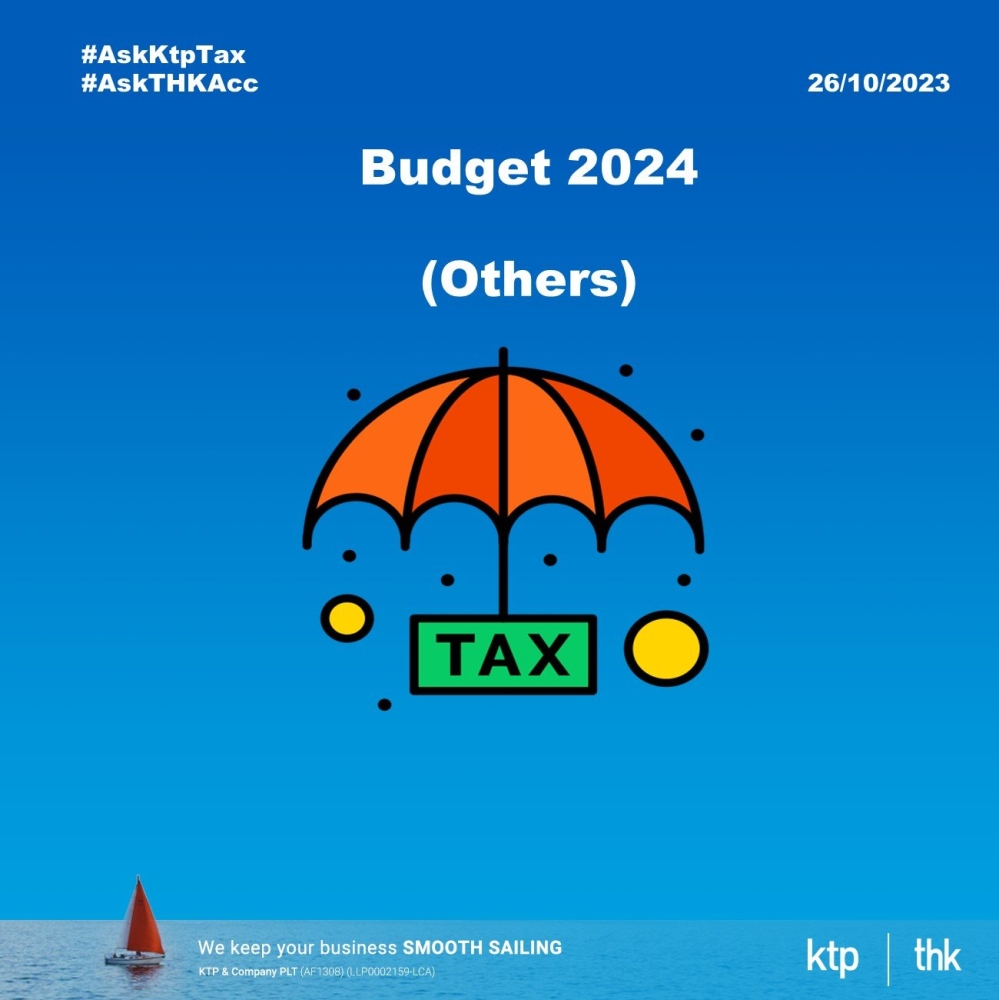
Malaysia's Budget 2024: A Glimpse into Others’ Important Updates
Budget 2024 introduces a wide range of financial reforms set to have a substantial impact on various sectors. These proposals are geared toward maintaining the fiscal responsibility of the nation while promoting economic growth.
In this last blog post, we will delve into the remaining key highlights of this budget to understand the changes and their implications
1. Capital Gains Tax (CGT)
As we approach 2024, a notable update is in the works concerning Capital Gains Tax (CGT) in Malaysia. This tax reform is set to affect the disposal of unlisted shares and aims to strike a balance between fiscal responsibility and economic growth.
Key Details:
• Disposal of unlisted shares
• Rate
• Except for
i. Initial Public Offering (IPO) approved by Bursa Malaysia; and
ii. Restructuring of shares within the same group.
• Effective from 1 March 2024
2. High-Value Goods Tax
Another significant development on the horizon is the introduction of the High-Value Goods Tax in Malaysia. This tax targets specific luxury items, such as jewellery and watches, and may influence your financial decisions.
Key Details:
• Specific high-value items (eg. jewellery and watches)
• Rates of 5% to 10%
• Based on the threshold value of good price
3. E-invoice
Embracing modern technology and digital solutions is a crucial step forward in the world of taxation. E-invoice, an electronic invoicing system, is set to bring substantial changes to how businesses manage their financial transactions. To accommodate this significant shift and ensure a smooth transition for taxpayers, the Government has introduced an extension to the enforcement timeline.
Key Details:
• Mandatory implementation for businesses with an annual income or sales exceeding RM100 million, beginning 1 August 2024.
• Second phased enforcement for other categories, with comprehensive implementation starting from 1 July 2025.
• Expanded usage of Tax Identification Number (TIN) to support e-invoice.
4. Conditions for Institutions/ Organisations/ Funds approved under Subsection 44(6) of Income Tax Act 1967 (ITA)
In the ever-evolving landscape of taxation, the Government has undertaken a review of the conditions governing institutions/ organisations/ funds approved under Subsection 44(6) of the ITA. These changes are designed to ensure compliance and promote transparency in the utilisation of accumulated funds for business activities.
Key Details:
• Reviewed the conditions:
i. Increase in the accumulated funds utilisation limit in business activities from 25% to 35%
ii. 2 options to continue with the benefits of the incentives:
iii. Consequences of breaching conditions and its impact on tax exemption
- DGIR will not withdraw the approval under subsection 44(6) for institutions/organisations/funds during the validity period.
- for any breach of conditions within the approval period, the institutions/organisations/funds will not be eligible for tax exemption
- DGIR will raise tax assessment on all income received by the institutions/organisations/funds in the YA the breach of conditions occurred.
• Effective Date From the year of assessment 2024.
5. Preferential tax rate
To boost the Malaysian film industry and attract foreign film production companies, actors, and crews, the government is introducing a preferential tax rate scheme
Key Details:
• For foreign film production companies, actors and crews filming in Malaysia
• Between 0% to 10%
In summary, as the nation looks forward, these changes are expected to contribute to a stronger and more secure future.
Budget 2024 Highlights - Past Updates
Individual : https://www.ktp.com.my/.../malaysias-budget-2024.../17oct23
Companies : https://www.ktp.com.my/.../malaysias-budget-2024.../18oct23
Tax Exemptions : https://www.ktp.com.my/.../malaysias-budget-2024.../19oct23
Tax Incentives : https://www.ktp.com.my/.../malaysias-budget-2024.../20oct23
Stamp Duty & Indirect Tax https://www.ktp.com.my/.../malaysias-budget-2024.../23oct23
Payroll (EPF & SOCSO) https://www.ktp.com.my/blog/malaysias-budget-2024-a-glimpse-into-epf-socso-updates/24oct23
Visit Us
-
Wisma KTP, 53 Jalan Molek 1/8, Taman Molek, 81100 Johor Bahru
-
Wisma THK, 41, Jalan Molek 1/8, Taman Molek, 81100 Johor Bahru
KTP (Audit, Tax, Advisory)
An approved audit firm and licensed tax firm operating under the KTP group based in Johor Bahru providing audit, tax planning, advisory and compliance services to clients
-
Website www.ktp.com.my
-
Instagram https://bit.ly/3jZuZuI
-
Linkedin https://bit.ly/3sapf4l
-
Telegram http://bit.ly/3ptmlpn
THK (Secretarial, Bookkeeping, Payroll, Advisory)
A licensed secretarial firm in Johor Bahru providing fast reliable incorporation, secretarial services, corporate compliance services, outsourcing bookkeeping, and payroll services to clients
-
Website www.thks.com.my
-
Facebook https://bit.ly/3nQ98rs
KTP Lifestyle
An internal community for our colleagues on work and leisure.
-
Tiktok http://bit.ly/3u9LR6Q
-
Youtube http://bit.ly/3ppmjyE
-
Facebook http://bit.ly/3ateoMz
-
Instagram https://bit.ly/3jZpKLo
KTP Career
An external job community on vacancies in Johor Bahru for interns, graduates & experienced candidates.
-
Instagram https://bit.ly/3u2PxHg
-
Facebook http://bit.ly/3rPxz9o
Malaysia's Budget 2024: Stamp Duty and Indirect Taxes Updates
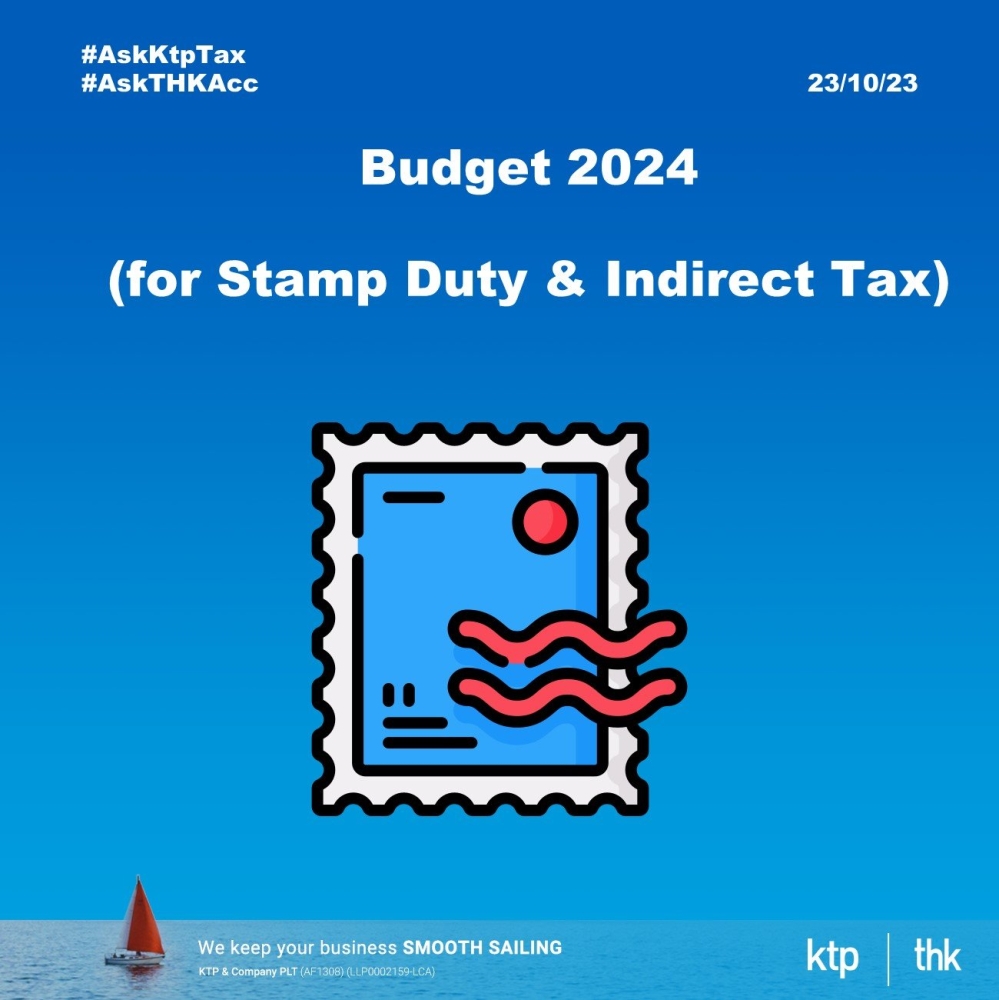
Malaysia's Budget 2024: A Glimpse into Stamp Duty and Indirect Taxes Updates
The budget 2024 encompasses a range of proposals that touch upon stamp duty and indirect taxes, critical elements of the country's fiscal framework.
Let's dive into the key highlights of these proposals, exploring how they will impact property ownership, service tax, and more, while striving to strike a balance between economic growth and citizens’ welfare
Stamp Duty
1. Transfer of property ownership by renunciates of rights
The proposal involves a review of the stamp duty rate imposed when a beneficiary renounces their right to another eligible beneficiary in accordance with a will/ Faraid, or the Distribution Act 1958. This change aims to replace the current ad valorem duty rate under Item 66(c) of the First Schedule of the Stamp Act 1949.
Key Details:
• A fixed duty of RM10 will be imposed
• Effective from 1 January 2024 for instrument of property ownership transfer.
2. Property ownership by non-citizen
The Budget 2024 introduces a crucial review of the stamp duty legislation, specifically focusing on properties owned by foreign-owned companies and non-citizen individuals in Malaysia. The existing policy treats these property owners the same as Malaysian citizens when it comes to the ad valorem stamp duty rate imposed during the transfer of property ownership.
This review is integral to a more comprehensive strategy aimed at controlling property prices in the country. By reassessing the stamp duty structure for foreign-owned properties and non-citizen individuals, the government intends to create a fair and competitive property market.
Key Details:
• A flat rate stamp duty of 4% be imposed on the instrument of transfer executed by foreign-owned companies and non-citizen individuals (except Malaysian permanent residents)
• Effective from 1 January 2024 for instrument of property ownership transfer.
Indirect Taxes
1. Service Tax
The government acknowledges the importance of increasing revenue while gradually reducing subsidies. To achieve this goal, it has proposed measures to broaden the country's revenue sources without overburdening the citizens. Although these measures are challenging, the government is considering an increase in the service tax rate and an expansion of its scope to encompass various industries.
Key Details:
• Increased from 6% to 8% except for telecommunication and food & beverage
• Expanded the scope to include logistics, brokerage, underwriting and karaoke services
2. Import Duty and Sales Tax Exemption on Manufacturing Aids
This proposal is poised to bring about a notable transformation in our industries, significantly boosting the competitiveness of Malaysian-manufactured products. It signifies a shift from the existing policy where manufacturers are not entitled import duty and sales tax exemptions on the importation and locally purchased of manufacturing aids under the Customs Act 1967 and the Sales Tax Act 2018.
Key Details:
• eligible to manufacturers on the importation and locally purchased of manufacturing aids
• subject to types of industry and category of goods determined
• Effective from 1 January 2024
3. Entertainments Duty Exemption
To support the development of the national creative industry, strengthen cultural unity, and foster family bonding, the Minister of Finance is proposing a series of exemption rates under the Entertainment Duty Act of 1953.
Key Details:
• Entertainment held in the Federal Territories
• Propose types and rate
i. Full exemption for stage performances by local artists
ii. Reduction from 25% to 10% for
stage performance by international artist/ light show/ Circus
film screening (Cinema) / theatre
exhibition/ Zoo/ Aquarium
sport event/ e-sports/ bowling/ snooker/ pool/ billiard/ karaoke
iii. Reduction from 25% to 5 % for theme parks, family recreation centre, indoor gaming centre, and simulators
• Applications received by the Ministry of Finance from 1 January 2024 to 31 December 2028
4. Excise Duty
In the interest of public health and the well-being of our citizens, particularly with a focus on preventing diseases such as diabetes and obesity, there are 2 proposals to raise the excise duty rate:
i. Sugar sweetened beverages
• Increased to RM0.50 per litre
• Effective From 1 January 2024
ii. Chewing tobacco
• Imposed a rate of 5% + RM27/kg under the tariff code 2403.99.5000.
• From 1 January 2024
In summary, the proposed changes in stamp duty and indirect taxes are part of a broader strategy to steer the nation towards greater economic prosperity while ensuring fairness and inclusivity in various sectors. As these policies take effect, it will be fascinating to see how they shape the future of Malaysia's economy and the lives of its people.
Budget 2024 Highlights - Past Updates
Individual : https://www.ktp.com.my/.../malaysias-budget-2024.../17oct23
Companies : https://www.ktp.com.my/blog/malaysias-budget-2024-a-glimpse-into-companies-updates-/18oct23
Tax Exemption https://www.ktp.com.my/blog/malaysias-budget-2024-a-glimpse-into-tax-exemption-updates/19oct23
Tax Incentive : https://www.ktp.com.my/blog/malaysias-budget-2024-a-glimpse-into-tax-incentives-updates/20oct23
Visit Us
-
Wisma KTP, 53 Jalan Molek 1/8, Taman Molek, 81100 Johor Bahru
-
Wisma THK, 41, Jalan Molek 1/8, Taman Molek, 81100 Johor Bahru
KTP (Audit, Tax, Advisory)
An approved audit firm and licensed tax firm operating under the KTP group based in Johor Bahru providing audit, tax planning, advisory and compliance services to clients
-
Website www.ktp.com.my
-
Instagram https://bit.ly/3jZuZuI
-
Linkedin https://bit.ly/3sapf4l
-
Telegram http://bit.ly/3ptmlpn
THK (Secretarial, Bookkeeping, Payroll, Advisory)
A licensed secretarial firm in Johor Bahru providing fast reliable incorporation, secretarial services, corporate compliance services, outsourcing bookkeeping, and payroll services to clients
-
Website www.thks.com.my
-
Facebook https://bit.ly/3nQ98rs
KTP Lifestyle
An internal community for our colleagues on work and leisure.
-
Tiktok http://bit.ly/3u9LR6Q
-
Youtube http://bit.ly/3ppmjyE
-
Facebook http://bit.ly/3ateoMz
-
Instagram https://bit.ly/3jZpKLo
KTP Career
An external job community on vacancies in Johor Bahru for interns, graduates & experienced candidates.
-
Instagram https://bit.ly/3u2PxHg
-
Facebook http://bit.ly/3rPxz9o
Malaysia's Budget 2024: A Glimpse into Companies Updates
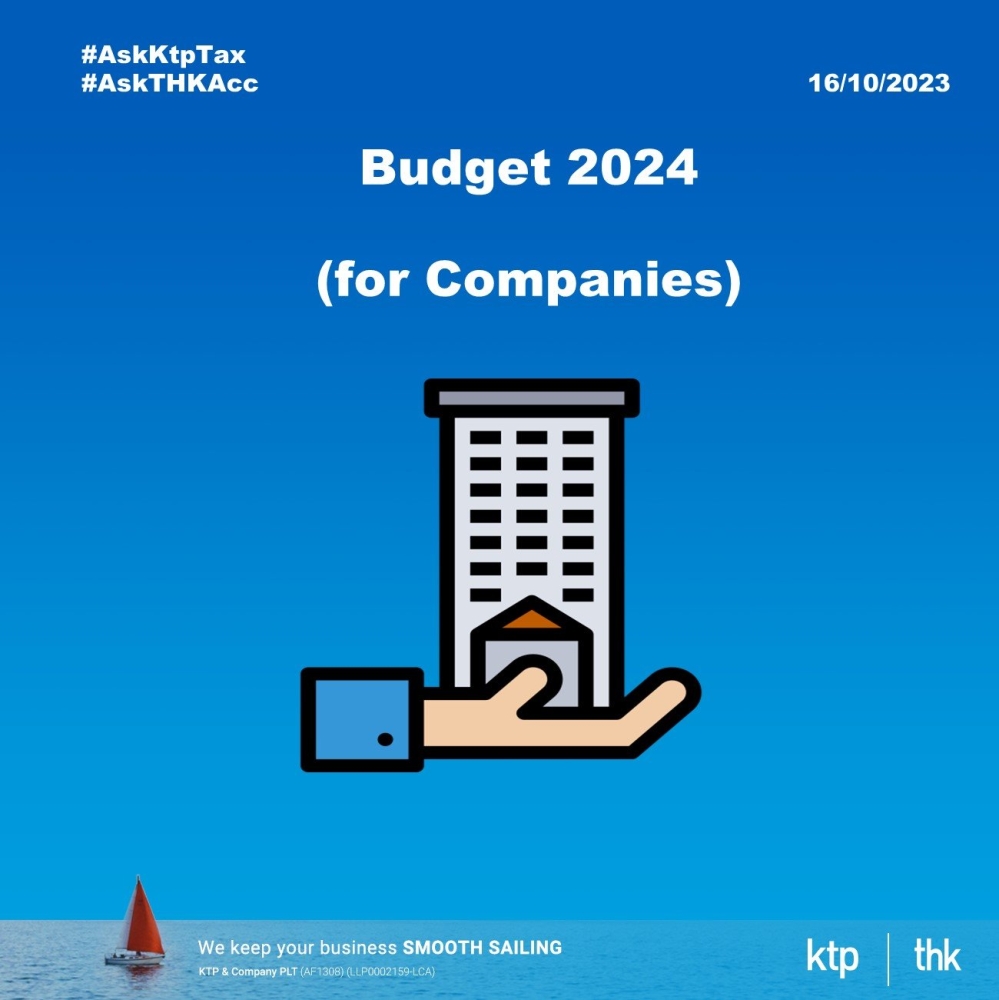
Malaysia's Budget 2024: A Glimpse into Companies Updates
The budget for the year 2024 was presented by Prime Minister and Finance Minister YAB Dato’ Seri Anwar Bin Ibrahim on 13th October 2023 and it includes proposals related to the Companies
Key summary on Budget 2024 for Companies under Deductions and Capital Allowance:
A) Tax Deduction
1. Environmental, Social and Governance (ESG) related expenditures
• Up to RM50,000 per YA
• Introduces related expenditures incurred to comply with ESG standards
• Applicable from YA 2024 to YA 2027
2. Cost of Sustainable and Responsible Investments (SRI) sukuk approved by the Securities Commission (SC)
• Extended from YA 2024 until YA 2027 (4 years)
3. Rental of non-commercial EV
• Up to RM300,000
• Extended from YA 2025 until the YA 2027 (2 years)
4. Contributions for Environmental Preservation and Conservation projects
• Involves contributing to or sponsoring activities related to tree planting projects or environmental preservation and conservation awareness projects verified by the Forest Research Institute Malaysia (FRIM)
• Applications received by the Ministry of Finance from 1 January 2024 to 31 December 2026
5. Voluntary Carbon Market
• Up to RM300,000
• Covers costs incurred on the Development and Measurement, Reporting and Verification (MRV) related to the development of carbon projects.
• Tax deduction against income from carbon credits traded on Bursa Carbon Exchange (BCX).
• Registered with an international standards body recognised by Bursa Malaysia and expenditure on development of carbon projects must be certified by the Malaysia Green Technology and Climate Change Corporation (MGTC)
• Applications received by the MGTC from 1 January 2024 until 31 December 2026
B) Capital Allowance
1. ICT equipment and computer software
• Revised to initial allowance (IA) at 40% and annual allowance (AA) at 20%
• Claiming period is shortened from 4 years to 3 years
• Effective from YA 2024
2. Industrial Building Allowance (IBA) – Private Nursing Home for Senior Citizens
• AA at 10% on the total cost of buildings purchased or built, including renovation costs.
• Approved by the Ministry of Health Malaysia (MOH)
• Expenditure incurred from 01 January 2024 to 31 December 2026
In summary, the Budget 2024 proposal for companies primarily focuses on environmental protection to encourage more private sector contributions through projects or community initiatives.
Budget 2024 Highlights - Others
Individual : https://www.ktp.com.my/.../malaysias-budget-2024.../17oct23
Visit Us
-
Wisma KTP, 53 Jalan Molek 1/8, Taman Molek, 81100 Johor Bahru
-
Wisma THK, 41, Jalan Molek 1/8, Taman Molek, 81100 Johor Bahru
KTP (Audit, Tax, Advisory)
An approved audit firm and licensed tax firm operating under the KTP group based in Johor Bahru providing audit, tax planning, advisory and compliance services to clients
-
Website www.ktp.com.my
-
Instagram https://bit.ly/3jZuZuI
-
Linkedin https://bit.ly/3sapf4l
-
Telegram http://bit.ly/3ptmlpn
THK (Secretarial, Bookkeeping, Payroll, Advisory)
A licensed secretarial firm in Johor Bahru providing fast reliable incorporation, secretarial services, corporate compliance services, outsourcing bookkeeping, and payroll services to clients
-
Website www.thks.com.my
-
Facebook https://bit.ly/3nQ98rs
KTP Lifestyle
An internal community for our colleagues on work and leisure.
-
Tiktok http://bit.ly/3u9LR6Q
-
Youtube http://bit.ly/3ppmjyE
-
Facebook http://bit.ly/3ateoMz
-
Instagram https://bit.ly/3jZpKLo
KTP Career
An external job community on vacancies in Johor Bahru for interns, graduates & experienced candidates.
-
Instagram https://bit.ly/3u2PxHg
-
Facebook http://bit.ly/3rPxz9o
Insolvency Act Amendments 2023

Insolvency Act Amendments 2023
Latest Development on Insolvency Malaysia
The Insolvency Act (Amended) 2023 will come into force on Friday (Oct 6), says Datuk Seri Azalina Othman Said.
The Minister in the Prime Minister's Department (Law and Institutional Reform) said the amendment resulted from discussions between the Attorney General's Department, Federal Court Chief Registrar, Finance Ministry, Bank Negara Malaysia, Inland Revenue Department, Employees Provident Fund, Credit Counselling and Management Agency and Associations of Bank Malaysia.
Key Summarise
Here's a summary of the key points from the Insolvency (Amendment) Act 2023
Discharge from Bankruptcy
The Insolvency (Amendment) Act 2023, effective from 06.10.2023, brings changes to bankruptcy regulations.
It expands the categories of bankrupt individuals who are protected from objections by creditors when a certificate of discharge from bankruptcy is issued by the Director General of Insolvency (DGI).
The existing Insolvency Act 1967 prohibits creditors from objecting to discharge for certain categories, including social guarantors, persons with disabilities, deceased individuals, and those with serious illnesses.
The Amending Act adds two new groups: bankrupts with mental disorders certified by a psychiatrist from a government hospital and bankrupts aged 70 or older, deemed incapable of contributing to estate administration by the DGI.
Automatic Discharge from Bankruptcy
The Amending Act revises Section 33C of the Act regarding a bankrupt's right to automatic discharge.
Previously, automatic discharge occurred after three years if the bankrupt met certain criteria.
Post-amendment, automatic discharge happens three years from the submission of the statement of affairs if the bankrupt pays a sum determined by the DGI for estate administration purposes.
This change is expected to benefit a significant number of bankrupt individuals in Malaysia, with an estimated 130,000 people being discharged from bankruptcy.
Suspension of Automatic Discharge from Bankruptcy
The Amending Act introduces the concept of suspending automatic discharge for up to two years if the bankrupt fails to comply with their obligations under the Act.
The suspension is effective upon notice from the DGI to creditors who filed a proof of debt within six months before the original three-year mark.
Remote Communication Technology and Electronic Communications:
Section 14 of the Amending Act allows the DGI to hold creditor meetings using remote communication technology, reflecting a transition to remote hearings due to the COVID-19 pandemic.
Previously, meetings were held at locations deemed convenient for the majority of creditors.
Section 13 of the Amending Act amends Section 130 of the Act to permit electronic means for serving notices when consent is obtained.
Visit Us
-
Wisma KTP, 53 Jalan Molek 1/8, Taman Molek, 81100 Johor Bahru
-
Wisma THK, 41, Jalan Molek 1/8, Taman Molek, 81100 Johor Bahru
KTP (Audit, Tax, Advisory)
An approved audit firm and licensed tax firm operating under the KTP group based in Johor Bahru providing audit, tax planning, advisory and compliance services to clients
-
Website www.ktp.com.my
-
Instagram https://bit.ly/3jZuZuI
-
Linkedin https://bit.ly/3sapf4l
-
Telegram http://bit.ly/3ptmlpn
THK (Secretarial, Bookkeeping, Payroll, Advisory)
A licensed secretarial firm in Johor Bahru providing fast reliable incorporation, secretarial services, corporate compliance services, outsourcing bookkeeping, and payroll services to clients
-
Website www.thks.com.my
-
Facebook https://bit.ly/3nQ98rs
KTP Lifestyle
An internal community for our colleagues on work and leisure.
-
Tiktok http://bit.ly/3u9LR6Q
-
Youtube http://bit.ly/3ppmjyE
-
Facebook http://bit.ly/3ateoMz
-
Instagram https://bit.ly/3jZpKLo
KTP Career
An external job community on vacancies in Johor Bahru for interns, graduates & experienced candidates.
-
Instagram https://bit.ly/3u2PxHg
-
Facebook http://bit.ly/3rPxz9o
e-Invoice Guideline 2.0
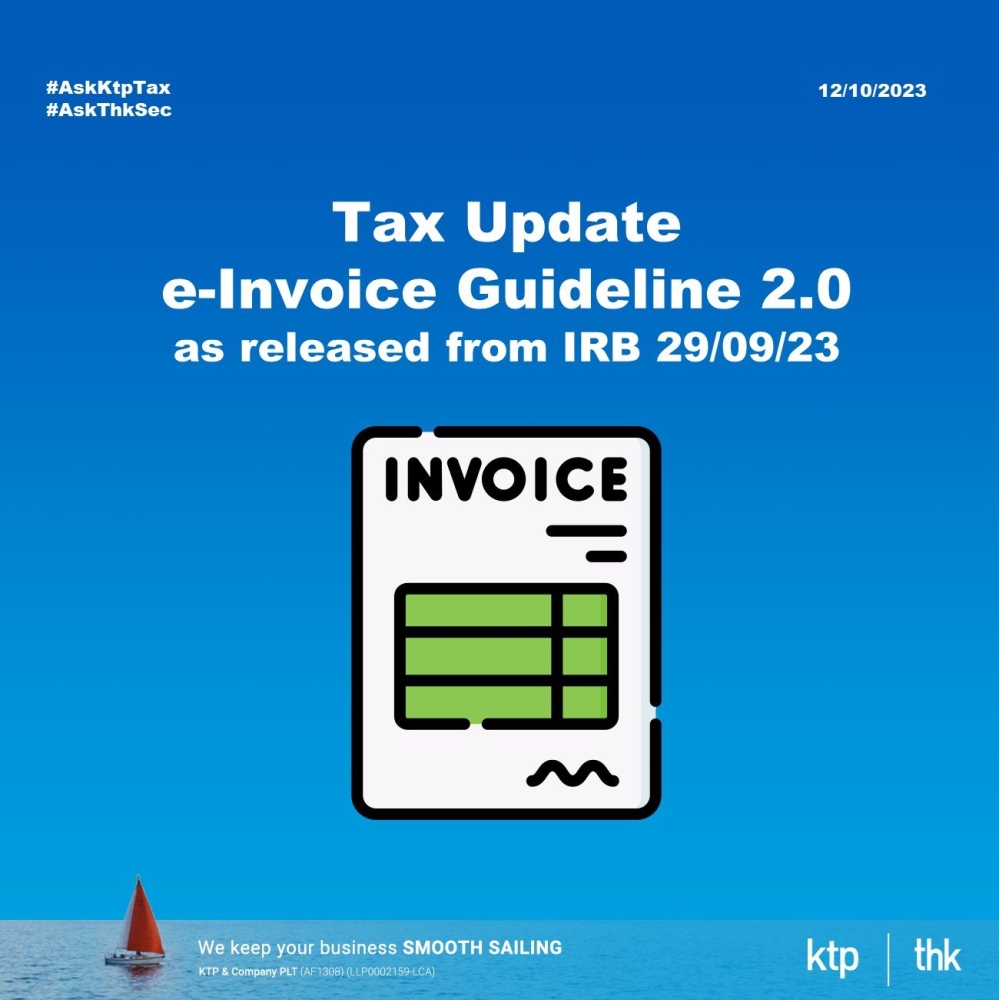
{Tax Update} e-Invoice Guideline 2.0
Latest Development on e-Invoice
The Inland Revenue Board of Malaysia (IRB) has updated its electronic invoice (e-Invoice) guidelines. Version 2.0 of the e-Invoice Guideline and a new Specific Guideline on e-Invoicing were released on September 29, 2023. A full 116-page document providing further guidance on specific areas of e-invoicing.
Key Changes to e-Invoice Guideline (Version 1.0 to Version 2.0):
Exempted Individuals/Entities
All individuals and legal entities must comply with e-invoice requirements, except for government, Rulers, local authorities, statutory authorities and statutory bodies, consular officers and diplomatic officers and facilities provided by the government, government bodies and government facilities such as clinics, multipurpose halls, etc.
These persons and authorities do not need to issue e-invoices, but their suppliers must issue e-invoices.
Companies listed on the stock exchange will be exempted from issuing e-invoices for dividend payments.
Consolidated E-Invoices
Businesses dealing with consumers need not issue an e-invoice on every sale. They can provide normal invoices to the customers. Such businesses can issue a consolidated invoice for the particular month, and this has to be done within seven days after the month’s end.
Consumers who require an e-invoice can request an e-invoice within the month of the purchase.
Suppliers can issue consolidated e-invoices monthly for specific B2C transactions exempt from e-invoicing for end consumers.
Certain activities, like motor vehicle sales, flight tickets, luxury goods, and construction contractors, require mandatory e-invoices.
E-Invoice Treatment
Invoices issued by the person registered under the e-invoicing system has to be validated or rejected by the purchaser within 72 hours. Otherwise, the invoice becomes final. In the event of a dispute, the only way to reverse the transaction is to issue a credit note and another invoice for the revised amount.
E-invoice treatment varies for disbursements or reimbursements.
Self-billed e-invoices apply to foreign suppliers, payments to agents, dealers & distributors, dividend distribution, e-commerce transactions, and acquisitions from individual taxpayers.
Exemptions for employment income, pension, alimony, certain dividends, zakat, and scholarships.
Transmission Mechanisms
Two e-invoice transmission mechanisms: MyInvois Portal hosted by IRBM and Application Programming Interface (API).
API configuration to be included in the Software Development Kit (SDK) expected in Q4 2023.
Foreign Income
E-invoices are required for all foreign income received in Malaysia from outside the country, serving as proof of income and expenses for tax purposes.
Data Fields
51 data fields, with some concessions for individual buyers, must be completed to issue an e-invoice.
Validated e-invoices include IRBM Unique Identifier Number, validation date, time, link, and QR code.
Previous Updates on E-Invoicing
-
E-Invoicing Malaysia - Transition Challenges and Strategies https://www.ktp.com.my/blog/e-invoicing-malaysia-transition-challenges-and-strategies/17aug23
-
Are you ready for e-Invoicing https://www.ktp.com.my/blog/e-invoicing-malaysia-are-you-ready/10aug23
-
The coverage of e-Invoicing https://www.ktp.com.my/blog/e-invoicing-malaysia-coverage/3aug23
-
The timeline of e-Invoicing https://www.ktp.com.my/blog/e-invoicing-malaysia-timeline/2aug23
-
The workflow of e-Invoicing https://www.ktp.com.my/blog/e-invoicing-malaysia-the-workflow/31jul23
Source
IRB e-Invoice version 2.0 https://www.hasil.gov.my/media/nofmzbk1/irbm-e-invoice-guideline-version-20.pdf
Visit Us
-
Wisma KTP, 53 Jalan Molek 1/8, Taman Molek, 81100 Johor Bahru
-
Wisma THK, 41, Jalan Molek 1/8, Taman Molek, 81100 Johor Bahru
KTP (Audit, Tax, Advisory)
An approved audit firm and licensed tax firm operating under the KTP group based in Johor Bahru providing audit, tax planning, advisory and compliance services to clients
-
Website www.ktp.com.my
-
Instagram https://bit.ly/3jZuZuI
-
Linkedin https://bit.ly/3sapf4l
-
Telegram http://bit.ly/3ptmlpn
THK (Secretarial, Bookkeeping, Payroll, Advisory)
A licensed secretarial firm in Johor Bahru providing fast reliable incorporation, secretarial services, corporate compliance services, outsourcing bookkeeping, and payroll services to clients
-
Website www.thks.com.my
-
Facebook https://bit.ly/3nQ98rs
KTP Lifestyle
An internal community for our colleagues on work and leisure.
-
Tiktok http://bit.ly/3u9LR6Q
-
Youtube http://bit.ly/3ppmjyE
-
Facebook http://bit.ly/3ateoMz
-
Instagram https://bit.ly/3jZpKLo
KTP Career
An external job community on vacancies in Johor Bahru for interns, graduates & experienced candidates.
-
Instagram https://bit.ly/3u2PxHg
-
Facebook http://bit.ly/3rPxz9o
OASB vs. Director General of Inland Revenue
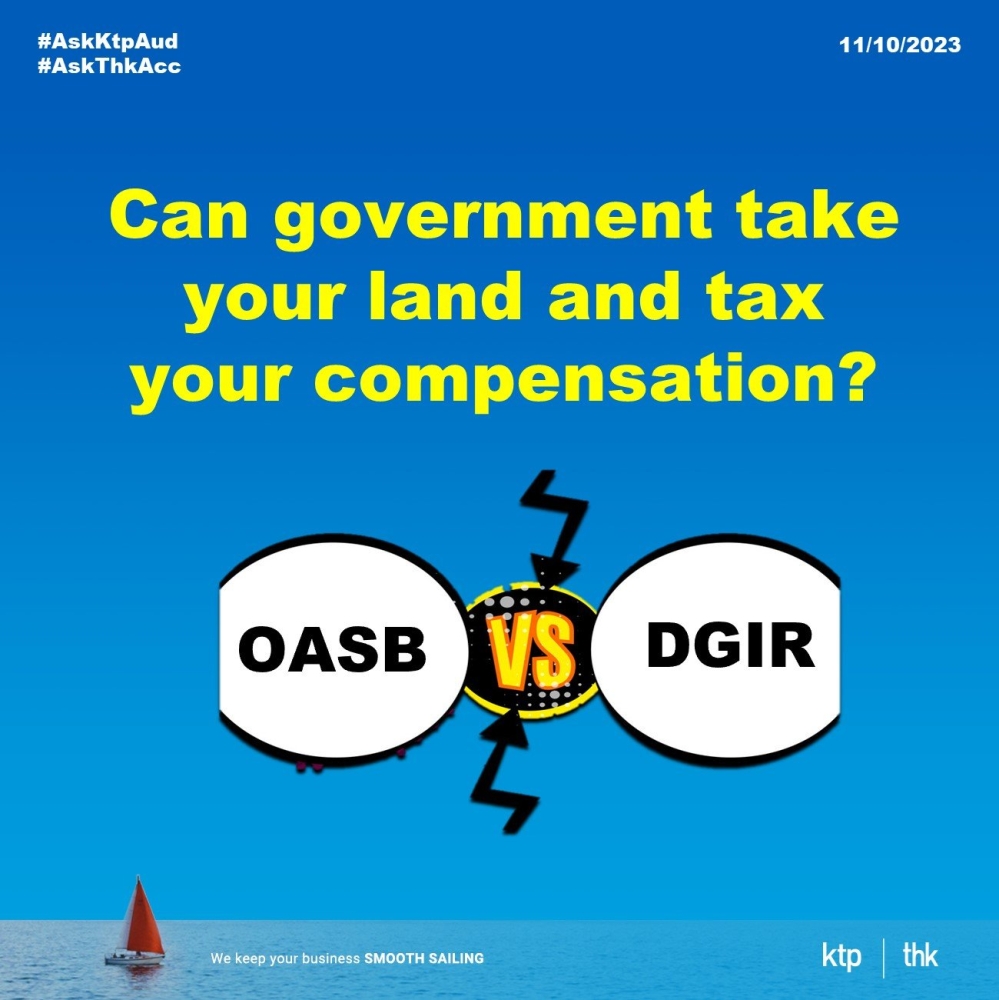
OASB vs. Director General of Inland Revenue
Overview compensation from the compulsory acquisition of land
Taxation can become a complex matter, especially when it involves components like compensation from the compulsory acquisition of land. In Malaysia, the tax treatment for compensation received from compulsory land acquisition can be scrutinized under various legal and regulatory frameworks. Below is a general outline of the tax treatment.
Tax Treatment of Compensation Received:
1. Determination of the Nature of Receipt:
Capital Receipt: Generally, if the land was used for investment purposes or was a capital asset, the compensation might be considered a capital receipt.
Revenue Receipt: If the land was utilized in a business, or the act of acquiring and selling lands was a business in itself, the compensation might be treated as revenue receipt.
2. Applicable Legislation:
Income Tax Act (ITA) 1967: Compensation is scrutinized under various sections of ITA to determine its taxability.
Section 4(a): Concerns the taxability of gains or profits from a business.
Section 4(f): Often pertains to other sources of income not categorized under sections 4(a) to 4(e).
3. Calculating Taxable Gain:
Real Property Gains Tax (RPGT) Act 1976: If compensation is considered a capital receipt, it may be subject to RPGT which is imposed on gains from the disposal of real property.
Compensation may need to be adjusted for enhancements and modifications made to the land to calculate the precise taxable amount.
Case Overview:
Join us in dissecting a compelling tax case involving OASB and the Director General of Inland Revenue (DGIR), revealing the trending tax, legal, and financial impact on compensation received from the compulsory acquisition of land.
Background
OASB, utilizing a rented shop lot for its audio-video business from 2004 to 2017, received RM2,341,817 as compensation due to government acquisition under Section 16 of the Land Acquisition Act 1960. However, the waters muddied when the DGIR issued a Notice of Additional Assessment along with a penalty, pursuant to Section 113(2) of the Income Tax Act (ITA) 1967.
Taxpayer's Argument
OASB fervently argued that the compensation should be categorized as a capital receipt, with a two-pronged rationale:
The compensation intended to restore the taxpayer’s position, based on the replacement cost at the time of compulsory acquisition.
The involuntary suspension of business activities during the acquisition resulted in a consequential loss of sales and profits.
DGIR’s Perspective
In opposition, the DGIR insisted it was a revenue receipt, taxable under Section 4(f) of ITA 1967, justifying that:
OASB lacked ownership rights over the land and building being compensated.
Section 4(f) of ITA 1967 broadly encompasses gains or profits outside the scope of Sections 4(a) to 4(e) for tax purposes.
Verdict from the Special Commissioners
Ultimately, the Special Commissioners of Income Tax sided with the DGIR, rejecting OASB's appeal and upholding the Notice of Additional Assessment along with its penalty.
Visit Us
-
Wisma KTP, 53 Jalan Molek 1/8, Taman Molek, 81100 Johor Bahru
-
Wisma THK, 41, Jalan Molek 1/8, Taman Molek, 81100 Johor Bahru
KTP (Audit, Tax, Advisory)
An approved audit firm and licensed tax firm operating under the KTP group based in Johor Bahru providing audit, tax planning, advisory and compliance services to clients
-
Website www.ktp.com.my
-
Instagram https://bit.ly/3jZuZuI
-
Linkedin https://bit.ly/3sapf4l
-
Telegram http://bit.ly/3ptmlpn
THK (Secretarial, Bookkeeping, Payroll, Advisory)
A licensed secretarial firm in Johor Bahru providing fast reliable incorporation, secretarial services, corporate compliance services, outsourcing bookkeeping, and payroll services to clients
-
Website www.thks.com.my
-
Facebook https://bit.ly/3nQ98rs
KTP Lifestyle
An internal community for our colleagues on work and leisure.
-
Tiktok http://bit.ly/3u9LR6Q
-
Youtube http://bit.ly/3ppmjyE
-
Facebook http://bit.ly/3ateoMz
-
Instagram https://bit.ly/3jZpKLo
KTP Career
An external job community on vacancies in Johor Bahru for interns, graduates & experienced candidates.
-
Instagram https://bit.ly/3u2PxHg
-
Facebook http://bit.ly/3rPxz9o
Memorandum & Articles of Association vs Constitution

M&A vs Constitution
Under the Companies Act 1965, every company was required to have a Memorandum and Articles of Association (M&A). According to the Companies Act 2016, the Memorandum and Articles of Association (M&A) are now referred to as the Constitution. Companies incorporating under the Companies Act 2016 are not obligated to have a constitution immediately upon incorporation. However, they have the option to adopt a constitution after the company has been incorporated.
The Differences
You may notice the following differences between M&A and the Constitution.
1. Number of Directors
2. Annual General Meeting
3. Reduction of Share Capital
4. Share Certificate
Number of Directors
In the M&A under the Companies Act, 1965, a minimum of two directors is required for Sdn Bhd.
However, Constitution is under the Companies Act, 2016, therefore if not being fixed by the company itself, sole director is allowable.
Annual General Meeting
During M&A era, an AGM was a mandatory requirement for a company, therefore the compliance of the timeframe to call for an AGM needs to be complied.
Whereas, in the new act regime, a Sdn. Bhd is no longer required to call for an AGM if the constitution is silent, where to follow the Companies Act, 2016 requirement.
Reduction of Share Capital
Under the Constitution regime, the reduction of share capital is a more streamlined process that outlines the requirement for solvency statements and other procedures
Whereas if under M&A regime of the Companies Act, 1965, it must go through a court order.
Share Certificates
In M&A, issuing a share certificate is a mandatory requirement for all shareholders, whereas, if the Constitution is silent, the issuance of a share certificate is upon request.
Key Takeaways
The above outline highlighted key differences between M&A and the Constitution regime, there are some more variances in terms of requirements of directors, holding of meeting procedures, issuance of dividends, and other pertinent aspects. To provide a more in-depth and details examination of these distinctions, further exploration of specific areas or aspects is needed.
Visit Us
-
Wisma KTP, 53 Jalan Molek 1/8, Taman Molek, 81100 Johor Bahru
-
Wisma THK, 41, Jalan Molek 1/8, Taman Molek, 81100 Johor Bahru
KTP (Audit, Tax, Advisory)
An approved audit firm and licensed tax firm operating under the KTP group based in Johor Bahru providing audit, tax planning, advisory and compliance services to clients
-
Website www.ktp.com.my
-
Instagram https://bit.ly/3jZuZuI
-
Linkedin https://bit.ly/3sapf4l
-
Telegram http://bit.ly/3ptmlpn
THK (Secretarial, Bookkeeping, Payroll, Advisory)
A licensed secretarial firm in Johor Bahru providing fast reliable incorporation, secretarial services, corporate compliance services, outsourcing bookkeeping, and payroll services to clients
-
Website www.thks.com.my
-
Facebook https://bit.ly/3nQ98rs
KTP Lifestyle
An internal community for our colleagues on work and leisure.
-
Tiktok http://bit.ly/3u9LR6Q
-
Youtube http://bit.ly/3ppmjyE
-
Facebook http://bit.ly/3ateoMz
-
Instagram https://bit.ly/3jZpKLo
KTP Career
An external job community on vacancies in Johor Bahru for interns, graduates & experienced candidates.
-
Instagram https://bit.ly/3u2PxHg
-
Facebook http://bit.ly/3rPxz9o
Failure to Furnish Information within a Stipulated Period
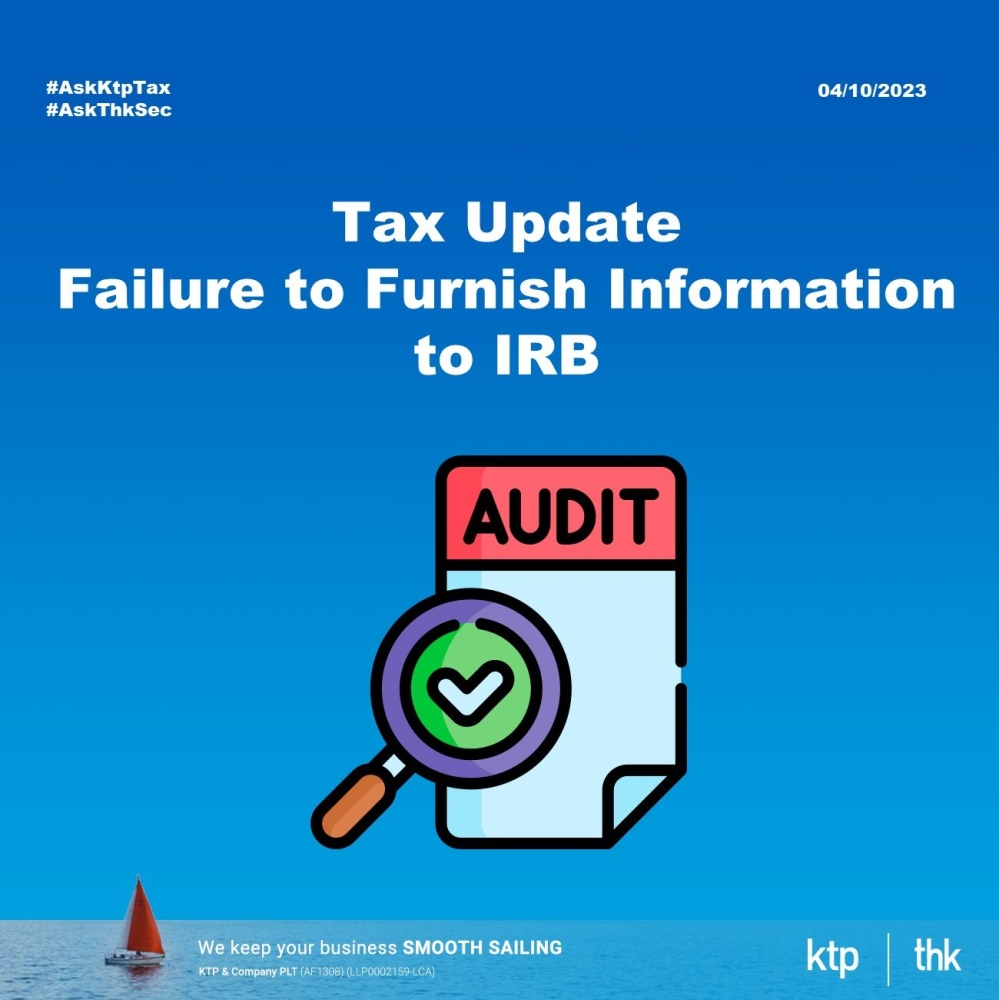
(Tax Update) : Failure to Furnish Information within a Stipulated Period
Overview
Taxation constitutes a fundamental pillar of the Malaysian economy, and the Inland Revenue Board of Malaysia (IRBM) assumes a pivotal role in upholding tax law compliance. One of its key functions involves conducting tax audits to verify the accuracy of income reporting and tax payments by taxpayers.
Public Ruling No. 3/2015 is a comprehensive guide that outlines taxpayer obligations. It covers record-keeping, the need for timely information submission, and the consequences of non-compliance. In this article, we delve into the insights offered by this crucial Public Ruling, providing clarity on Malaysian taxpayers' responsibilities.
Key takeaways:
You will understand:
• How to secure deduction claims?
• What types of supporting documents that IRBM has the power to call?
• Who holds the responsibility for maintaining records and supporting documents?
• What are the consequences of failing to furnish documents within the prescribed timeframe?
• Can the taxpayer apply for an extension of time with IRBM?
Summary of learnings:
How to secure the deduction claims?
Taxpayers must submit specific supporting documents within the prescribed timeframe as set out by the IRBM in the notice issued under section 81 of the Income Tax Act 1967 (ITA).
What types of supporting documents that IRBM has the power to call?
IRBM has the authority to request various supporting documents, including books of accounts, invoices, vouchers, receipts, and any other records specified by IRBM.
Who holds the responsibility for maintaining records and supporting documents?
Taxpayers are responsible for keeping financial records and documents for seven years from the end of the year of assessment in which the Income Tax Return Form (ITRF) is furnished.
What are the consequences of failing to furnish documents within the prescribed timeframe?
Failure to provide requested documents within the stipulated time may result in the disallowance of claimed expenses for tax deduction under subsection 39(1A) of the ITA.
Can the taxpayer apply for an extension of time with IRBM?
Yes, taxpayers can apply for an extension of time from IRBM, provided the application is made before the stipulated timeframe expires and valid reasons are provided.
The approval status and details of the application will be issued in the form of a notice by IRBM.
Source:
Public Ruling No. 3/2015: Failure to Furnish Information within a Stipulated Period
Visit Us
-
Wisma KTP, 53 Jalan Molek 1/8, Taman Molek, 81100 Johor Bahru
-
Wisma THK, 41, Jalan Molek 1/8, Taman Molek, 81100 Johor Bahru
KTP (Audit, Tax, Advisory)
An approved audit firm and licensed tax firm operating under the KTP group based in Johor Bahru providing audit, tax planning, advisory and compliance services to clients
-
Website www.ktp.com.my
-
Instagram https://bit.ly/3jZuZuI
-
Linkedin https://bit.ly/3sapf4l
-
Telegram http://bit.ly/3ptmlpn
THK (Secretarial, Bookkeeping, Payroll, Advisory)
A licensed secretarial firm in Johor Bahru providing fast reliable incorporation, secretarial services, corporate compliance services, outsourcing bookkeeping, and payroll services to clients
-
Website www.thks.com.my
-
Facebook https://bit.ly/3nQ98rs
KTP Lifestyle
An internal community for our colleagues on work and leisure.
-
Tiktok http://bit.ly/3u9LR6Q
-
Youtube http://bit.ly/3ppmjyE
-
Facebook http://bit.ly/3ateoMz
-
Instagram https://bit.ly/3jZpKLo
KTP Career
An external job community on vacancies in Johor Bahru for interns, graduates & experienced candidates.
-
Instagram https://bit.ly/3u2PxHg
-
Facebook http://bit.ly/3rPxz9o
Tips For Graduates In Accounting Industry

Tips For Graduates In Accounting Industry
My tips to our fresh #graduates in our professional industry :
1. Embrace a Learning Mindset
Approach your internship with an open and receptive mindset. Recognize that this is a valuable learning opportunity where you can acquire new skills, industry knowledge, and gain exposure to real-world scenarios.
Take every task as a chance to learn and grow, and actively seek feedback from your supervisors and colleagues.
2. Develop Strong Technical Skills
Audit and tax internships require a solid foundation of technical skills. Familiarize yourself with the fundamental concepts, regulations, and industry standards relevant to your role.
Stay updated with the latest developments in accounting principles, tax laws, and auditing procedures.
3. Master Time Management
In the fast-paced world of audit and tax, efficient time management is crucial. Learn to prioritize tasks effectively, set realistic deadlines, and allocate your time accordingly.
Use tools like to-do lists, calendars, and project management software (Trello as we did) to stay organized and ensure the timely completion of assignments.
4. Nurture Effective Communication Skills
Strong communication skills are essential in any professional setting. As an intern, you will interact with team members, clients, and stakeholders at various levels.
5. Seek Mentors and Network
Take advantage of the wealth of knowledge and experience available to you within your organization. Seek out mentors who can guide you in your career journey and provide valuable insights.
6. Embody Professionalism (one of KTP core value)
Demonstrate professionalism in all aspects of your internship. Adhere to company policies and ethical guidelines, maintain confidentiality, and exhibit a high level of integrity.
These qualities will help you establish a strong professional reputation and position you for future opportunities.
YouTube Video
🎥 Explore Career Success with Our Latest Video on KTP YouTube 🎥
https://lnkd.in/gBjDuuv5
Source
Authored by Mr Koh Teck Peng, our Group Principal in his personal LinkedIn posting
https://bit.ly/3PJ0rxF
Visit Us
-
Wisma KTP, 53 Jalan Molek 1/8, Taman Molek, 81100 Johor Bahru
-
Wisma THK, 41, Jalan Molek 1/8, Taman Molek, 81100 Johor Bahru
KTP (Audit, Tax, Advisory)
An approved audit firm and licensed tax firm operating under the KTP group based in Johor Bahru providing audit, tax planning, advisory and compliance services to clients
-
Website www.ktp.com.my
-
Instagram https://bit.ly/3jZuZuI
-
Linkedin https://bit.ly/3sapf4l
-
Telegram http://bit.ly/3ptmlpn
THK (Secretarial, Bookkeeping, Payroll, Advisory)
A licensed secretarial firm in Johor Bahru providing fast reliable incorporation, secretarial services, corporate compliance services, outsourcing bookkeeping, and payroll services to clients
-
Website www.thks.com.my
-
Facebook https://bit.ly/3nQ98rs
KTP Lifestyle
An internal community for our colleagues on work and leisure.
-
Tiktok http://bit.ly/3u9LR6Q
-
Youtube http://bit.ly/3ppmjyE
-
Facebook http://bit.ly/3ateoMz
-
Instagram https://bit.ly/3jZpKLo
KTP Career
An external job community on vacancies in Johor Bahru for interns, graduates & experienced candidates.
-
Instagram https://bit.ly/3u2PxHg
-
Facebook http://bit.ly/3rPxz9o
Tips For Graduates In Accounting Industry

Tips For Graduates In Accounting Industry
My tips to our fresh #graduates in our professional industry :
1. Embrace a Learning Mindset
Approach your internship with an open and receptive mindset. Recognize that this is a valuable learning opportunity where you can acquire new skills, industry knowledge, and gain exposure to real-world scenarios.
Take every task as a chance to learn and grow, and actively seek feedback from your supervisors and colleagues.
2. Develop Strong Technical Skills
Audit and tax internships require a solid foundation of technical skills. Familiarize yourself with the fundamental concepts, regulations, and industry standards relevant to your role.
Stay updated with the latest developments in accounting principles, tax laws, and auditing procedures.
3. Master Time Management
In the fast-paced world of audit and tax, efficient time management is crucial. Learn to prioritize tasks effectively, set realistic deadlines, and allocate your time accordingly.
Use tools like to-do lists, calendars, and project management software (Trello as we did) to stay organized and ensure the timely completion of assignments.
4. Nurture Effective Communication Skills
Strong communication skills are essential in any professional setting. As an intern, you will interact with team members, clients, and stakeholders at various levels.
5. Seek Mentors and Network
Take advantage of the wealth of knowledge and experience available to you within your organization. Seek out mentors who can guide you in your career journey and provide valuable insights.
6. Embody Professionalism (one of KTP core value)
Demonstrate professionalism in all aspects of your internship. Adhere to company policies and ethical guidelines, maintain confidentiality, and exhibit a high level of integrity.
These qualities will help you establish a strong professional reputation and position you for future opportunities.
YouTube Video
🎥 Explore Career Success with Our Latest Video on KTP YouTube 🎥
https://lnkd.in/gBjDuuv5
Source
Authored by Mr Koh Teck Peng, our Group Principal in his personal LinkedIn posting
https://bit.ly/3PJ0rxF
Visit Us
-
Wisma KTP, 53 Jalan Molek 1/8, Taman Molek, 81100 Johor Bahru
-
Wisma THK, 41, Jalan Molek 1/8, Taman Molek, 81100 Johor Bahru
KTP (Audit, Tax, Advisory)
An approved audit firm and licensed tax firm operating under the KTP group based in Johor Bahru providing audit, tax planning, advisory and compliance services to clients
-
Website www.ktp.com.my
-
Instagram https://bit.ly/3jZuZuI
-
Linkedin https://bit.ly/3sapf4l
-
Telegram http://bit.ly/3ptmlpn
THK (Secretarial, Bookkeeping, Payroll, Advisory)
A licensed secretarial firm in Johor Bahru providing fast reliable incorporation, secretarial services, corporate compliance services, outsourcing bookkeeping, and payroll services to clients
-
Website www.thks.com.my
-
Facebook https://bit.ly/3nQ98rs
KTP Lifestyle
An internal community for our colleagues on work and leisure.
-
Tiktok http://bit.ly/3u9LR6Q
-
Youtube http://bit.ly/3ppmjyE
-
Facebook http://bit.ly/3ateoMz
-
Instagram https://bit.ly/3jZpKLo
KTP Career
An external job community on vacancies in Johor Bahru for interns, graduates & experienced candidates.
-
Instagram https://bit.ly/3u2PxHg
-
Facebook http://bit.ly/3rPxz9o
What are proxy rules in the meeting ?

What are proxy rules in the meeting ?
What exactly is a proxy?
In the world of business and formal meetings, a ''proxy'' refers to a person who appointed to represent someone else, typically when the primary individual is unable to attend the meeting themselves. The proxy has the responsibility to act on behalf of the absent individual, making decisions, casting votes, or conveying information as required during the meeting.
What if only one proxy?
If a member appoints a proxy during a meeting and that proxy can vote on show of hands. The proxy allows to make important decisions and discussions to proceed even when key stakeholders cannot be physically present. It ensures that their interests are still represented and their input is considered.
Can a member choose more than one proxy?
Certainly! A member eligible to vote can pick one or more proxies. But remember, these proxies can only vote in a poll.
However, the appointment only counts if the member specifies how much of their stake each proxy represents.
What is Proxy’s responsibility?
The responsibilities of a proxy can vary depending on the context in which they are appointed and the specific instructions or authority granted to them by the absent individual. However, here are some common responsibilities associated with being a proxy: -
a) Representing:
The primary responsibility of a proxy is to represent the absent individual faithfully and in accordance with their interests, preferences, and instructions. This includes speaking on their behalf, voting as directed, and making decisions in their stead.
b) Attendance:
Proxies are expected to attend the meeting or event in place of the absent individual. They should arrive on time and be prepared to participate in discussions, votes, and any other relevant activities.
c) Knowledge and Preparation:
A proxy should be knowledgeable about the issues, topics, or agenda items to be discussed at the meeting. They may need to review relevant materials or information in advance to make informed decisions on behalf of the absent party.
d) Voting:
If voting is part of the meeting, a proxy typically casts votes as instructed by the absent individual. This may involve voting on resolutions, proposals, or other matters according to the absent individual’s preferences.
e) Reporting:
After the meeting, a proxy may be required to provide a report or summary to the absent party, detailing what transpired during the meeting, the decisions made, and any important discussion or outcomes.
f) Communication:
Proxies often serve as a communication channel between the absent individual and other participants in the meeting. They may convey messages, questions, or requests as necessary.
g) Adherence to Instructions:
It’s crucial for a proxy to strictly adhere to the instruction, limitations, and wishes of the absent individual. They should not make decisions or take actions that go against the absent party’s directives.
h) Confidentiality:
If sensitive or confidential information is discussed during the meeting, a proxy must maintain confidentiality and not disclose such information to unauthorised parties.
i) Ethical Conduct:
Proxies should act with honesty, integrity, and in a manner consistent with ethical standards. They should avoid conflicts of interest and act in the best interests of the absent individual.
Key Summary
It is important for individuals acting as proxies to have a clear understanding of their role and responsibilities, as well as any legal or contractual obligations associated with their appointment. They should also maintain open communication with the absent party to ensure they fulfil their duties effectively.
Visit Us
-
Wisma KTP, 53 Jalan Molek 1/8, Taman Molek, 81100 Johor Bahru
-
Wisma THK, 41, Jalan Molek 1/8, Taman Molek, 81100 Johor Bahru
KTP (Audit, Tax, Advisory)
An approved audit firm and licensed tax firm operating under the KTP group based in Johor Bahru providing audit, tax planning, advisory and compliance services to clients
-
Website www.ktp.com.my
-
Instagram https://bit.ly/3jZuZuI
-
Linkedin https://bit.ly/3sapf4l
-
Telegram http://bit.ly/3ptmlpn
THK (Secretarial, Bookkeeping, Payroll, Advisory)
A licensed secretarial firm in Johor Bahru providing fast reliable incorporation, secretarial services, corporate compliance services, outsourcing bookkeeping, and payroll services to clients
-
Website www.thks.com.my
-
Facebook https://bit.ly/3nQ98rs
KTP Lifestyle
An internal community for our colleagues on work and leisure.
-
Tiktok http://bit.ly/3u9LR6Q
-
Youtube http://bit.ly/3ppmjyE
-
Facebook http://bit.ly/3ateoMz
-
Instagram https://bit.ly/3jZpKLo
KTP Career
An external job community on vacancies in Johor Bahru for interns, graduates & experienced candidates.
-
Instagram https://bit.ly/3u2PxHg
-
Facebook http://bit.ly/3rPxz9o
(Tax Update) : Use Of e-WHT For WHT Payment
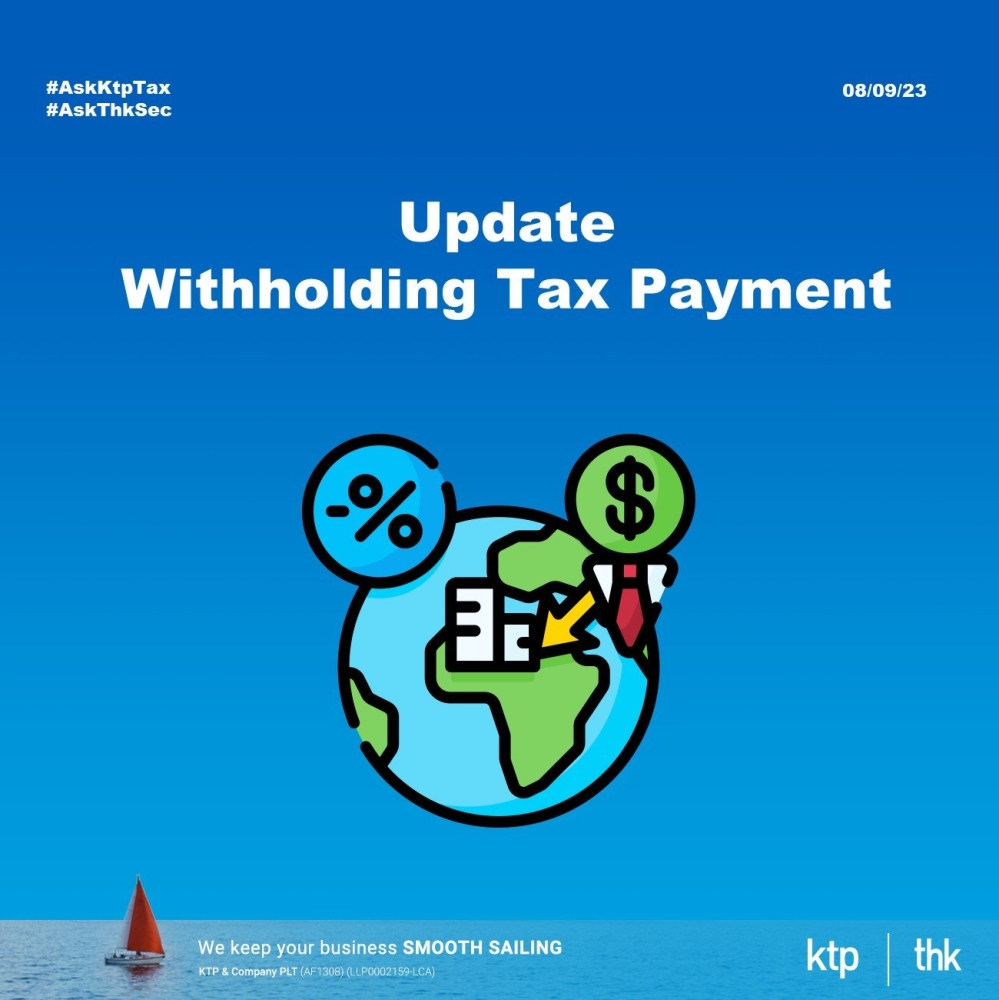
(Tax Update) : Use Of e-WHT For WHT Payment
IRB Public Annoucement
The Inland Revenue Board of Malaysia has issued a media release dated 30 August 2023 on encouraging the use of electronic withholding tax (e-WHT) for WHT payment on its website.
From 1 January 2023, HASiL started this e-WHT system to make tax payments simpler.
e-WHT is one of the e-taxation services which is compulsory to be used online in stages with effect from 1 September 2023. Taxpayers will have to use it step by step, starting 1 September 2023.
How to e-WHT
Payment of WHT through e-WHT will use the Bill Number as a payment reference which can be made through the FPX method at the HASiL Payment Portal (ByrHASiL) or can be accessed via the MyTax Portal https://mytax.hasil.gov.my.
e-WHT enables proof of receipt of payment to be issued directly and data to be received directly by HASiL as soon as payment is made.
Taxpayers who wish to make WHT payments through e-WHT need to access the system by first logging in using their MyTax identification (ID) information for access at ezHasil Services > eWHT. A Bill Number will be generated automatically after the form is successfully submitted online with complete information.
KTP Thoughts
The Inland Revenue Board of Malaysia will mandate the use of e-services through the MyTax portal in stages from 1 September 2023. This is in line with the government’s digitalisation of service delivery systems, with full implementation expected by 1 January 2024.
Taxpayers are advised to switch to online services for all transactions, including online payment methods, to ensure that the transactions are safe and in order.
Visit Us
-
Wisma KTP, 53 Jalan Molek 1/8, Taman Molek, 81100 Johor Bahru
-
Wisma THK, 41, Jalan Molek 1/8, Taman Molek, 81100 Johor Bahru
KTP (Audit, Tax, Advisory)
An approved audit firm and licensed tax firm operating under the KTP group based in Johor Bahru providing audit, tax planning, advisory and compliance services to clients
-
Website www.ktp.com.my
-
Instagram https://bit.ly/3jZuZuI
-
Linkedin https://bit.ly/3sapf4l
-
Telegram http://bit.ly/3ptmlpn
THK (Secretarial, Bookkeeping, Payroll, Advisory)
A licensed secretarial firm in Johor Bahru providing fast reliable incorporation, secretarial services, corporate compliance services, outsourcing bookkeeping, and payroll services to clients
-
Website www.thks.com.my
-
Facebook https://bit.ly/3nQ98rs
KTP Lifestyle
An internal community for our colleagues on work and leisure.
-
Tiktok http://bit.ly/3u9LR6Q
-
Youtube http://bit.ly/3ppmjyE
-
Facebook http://bit.ly/3ateoMz
-
Instagram https://bit.ly/3jZpKLo
KTP Career
An external job community on vacancies in Johor Bahru for interns, graduates & experienced candidates.
-
Instagram https://bit.ly/3u2PxHg
-
Facebook http://bit.ly/3rPxz9o
(Tax Update) : Special Voluntary Disclosure Programme 2.0 guidelines

(Tax Update) : Special Voluntary Disclosure Programme 2.0 guidelines
IRB Public Annoucement
Based on IRB website, 22 August 2023, The Inland Revenue Board of Malaysia (IRB) may now conduct tax audits/investigations on the year of assessment the voluntary disclosure is made.
If the voluntary disclosure is made on non-transfer pricing matters only and the IRBM finds there is a risk of transfer pricing issues, a tax audit/investigation can be performed.
Conversely, if the taxpayer makes a voluntary disclosure of transfer pricing matters only, a tax audit/investigation can be performed on non-transfer pricing issues.
In the previous Special Voluntary Disclosure Programme 2.0 guidelines, a tax audit/investigation can only be carried out if the taxpayer fails to make the voluntary disclosure payment within the stipulated period.
In Taxpayers' Words
If you only report non-transfer pricing problems but IRB finds transfer pricing issues, IRB can still investigate those transfer pricing issues.
Similarly, if you only report transfer pricing problems, IRB can look into other unrelated issues.
KTP Thoughts
The implication for taxpayers is that even if they voluntarily disclose issues in one area, they could still be investigated for problems in other areas they didn't disclose.
This means taxpayers should be thorough and transparent in all areas to reduce the risk of audits or investigations.
Visit Us
-
Wisma KTP, 53 Jalan Molek 1/8, Taman Molek, 81100 Johor Bahru
-
Wisma THK, 41, Jalan Molek 1/8, Taman Molek, 81100 Johor Bahru
KTP (Audit, Tax, Advisory)
An approved audit firm and licensed tax firm operating under the KTP group based in Johor Bahru providing audit, tax planning, advisory and compliance services to clients
-
Website www.ktp.com.my
-
Instagram https://bit.ly/3jZuZuI
-
Linkedin https://bit.ly/3sapf4l
-
Telegram http://bit.ly/3ptmlpn
THK (Secretarial, Bookkeeping, Payroll, Advisory)
A licensed secretarial firm in Johor Bahru providing fast reliable incorporation, secretarial services, corporate compliance services, outsourcing bookkeeping, and payroll services to clients
-
Website www.thks.com.my
-
Facebook https://bit.ly/3nQ98rs
KTP Lifestyle
An internal community for our colleagues on work and leisure.
-
Tiktok http://bit.ly/3u9LR6Q
-
Youtube http://bit.ly/3ppmjyE
-
Facebook http://bit.ly/3ateoMz
-
Instagram https://bit.ly/3jZpKLo
KTP Career
An external job community on vacancies in Johor Bahru for interns, graduates & experienced candidates.
-
Instagram https://bit.ly/3u2PxHg
-
Facebook http://bit.ly/3rPxz9o
Update of our services during this challenging time
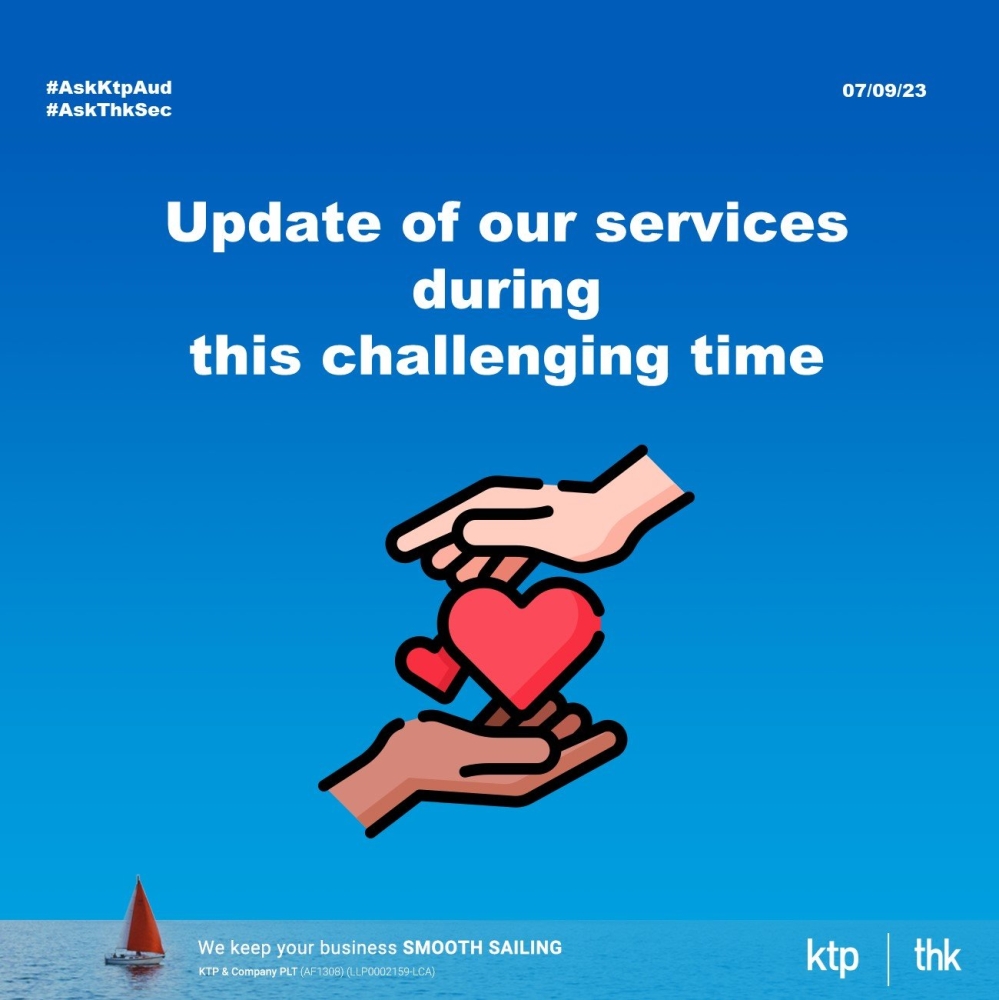
Update of our services during this challenging time
Dear Clients :
I hope this message finds you well.
I want to personally reach out to provide an update on our services during this challenging period.
First and foremost, I'd like to extend our sincere gratitude for your continued trust in our firm. We understand the importance of timely and accurate auditing/taxation, especially in these crucial times.
While we always aim to deliver top-notch service, we acknowledge that some aspects of our recent service delivery may not have met the standards you've come to expect from us.
As an accounting firm, our commitment to transparency and diligence remains steadfast, and it's vital for us to provide context.
The recent constraints, primarily due to a reduced workforce, have affected our usual efficiency and response times.
While this challenge is being faced by many businesses, we comprehend that it does not lessen the significance of your financial concerns or obligations.
Rest assured, we are implementing various strategies to mitigate these issues. These include deploying advanced auditing software, re-prioritizing tasks, and adjusting workflows to minimize potential delays, training and development.
It's essential to underscore that these are temporary solutions in response to unprecedented challenges. Our dedication to ensuring meticulous accounting and financial oversight remains our top priority.
Your partnership means a great deal to us, and we are committed to making the necessary adjustments to serve you better in the days ahead.
Please feel free to share any concerns or suggestions with us. Your insights are invaluable in our journey of continuous improvement.
My email is tpkoh@ktp.com.my or you can leave a message on our Google Business page https://g.page/r/CSeHx4H8B4oPEBM/review
Thank you for your understanding and patience during this period.
Warm regards,
KTP Group of Company
Koh Teck Peng
Principal
Visit Us
-
Wisma KTP, 53 Jalan Molek 1/8, Taman Molek, 81100 Johor Bahru
-
Wisma THK, 41, Jalan Molek 1/8, Taman Molek, 81100 Johor Bahru
KTP (Audit, Tax, Advisory)
An approved audit firm and licensed tax firm operating under the KTP group based in Johor Bahru providing audit, tax planning, advisory and compliance services to clients
-
Website www.ktp.com.my
-
Instagram https://bit.ly/3jZuZuI
-
Linkedin https://bit.ly/3sapf4l
-
Telegram http://bit.ly/3ptmlpn
THK (Secretarial, Bookkeeping, Payroll, Advisory)
A licensed secretarial firm in Johor Bahru providing fast reliable incorporation, secretarial services, corporate compliance services, outsourcing bookkeeping, and payroll services to clients
-
Website www.thks.com.my
-
Facebook https://bit.ly/3nQ98rs
KTP Lifestyle
An internal community for our colleagues on work and leisure.
-
Tiktok http://bit.ly/3u9LR6Q
-
Youtube http://bit.ly/3ppmjyE
-
Facebook http://bit.ly/3ateoMz
-
Instagram https://bit.ly/3jZpKLo
KTP Career
An external job community on vacancies in Johor Bahru for interns, graduates & experienced candidates.
-
Instagram https://bit.ly/3u2PxHg
-
Facebook http://bit.ly/3rPxz9o
(Tax Update) : The Appointment of Representative for Company Director
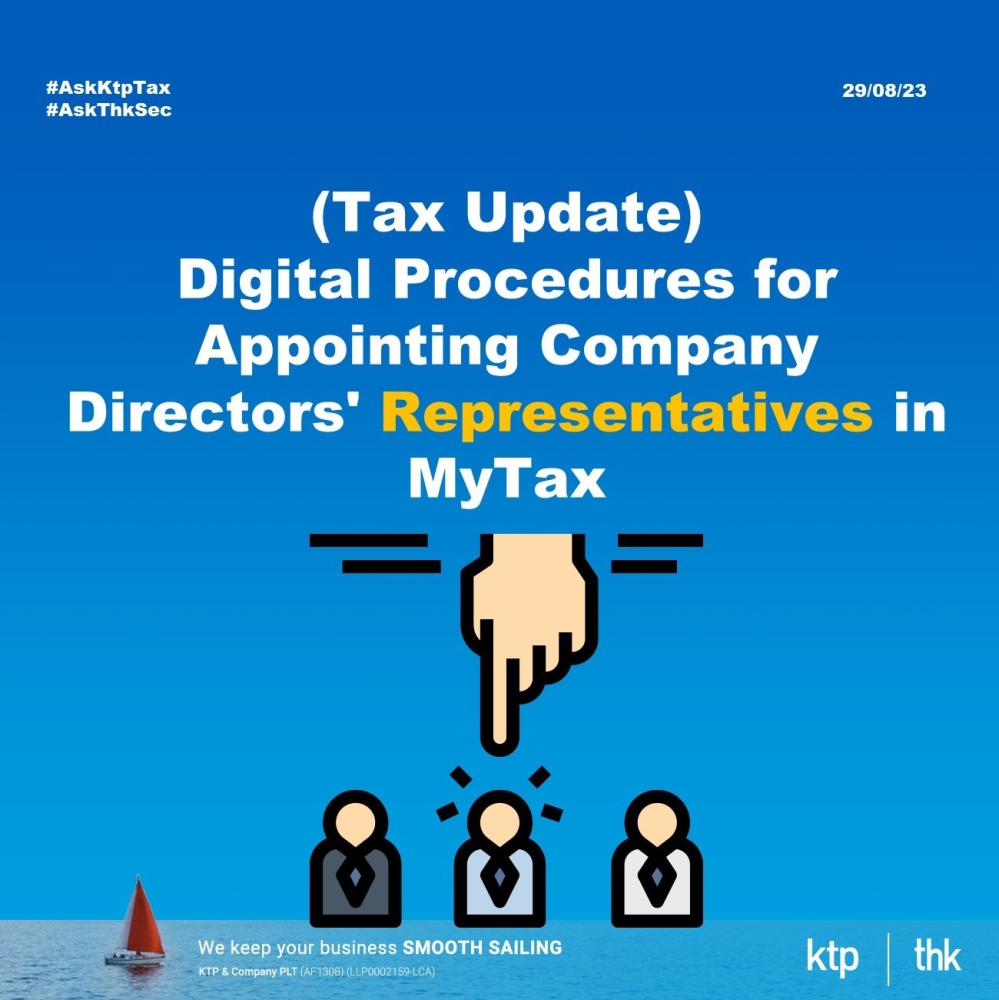
(Tax Update) : The Appointment of Representative for Company Director
Overview of Tax Representative
The introduction of these new functions and guidelines emphasizes the importance of adapting to the digital era, ensuring that company representatives are adequately equipped, and maintaining the integrity of tax submissions. It also showcases the commitment to streamline processes while ensuring that appropriate checks and balances are in place for accountability.
Key Takeaways
From 1 January 2023, taxpayers who have the role of Company Director in MyTax can appoint a representative online.
The appointed representative must have a Tax Identification Number (TIN) and an Individual Digital Certificate.
IRBM has the right to obtain a letter of appointment as a Representative using the letterhead of the company or organization signed by the Board of Directors of the company/organization in question.
IRBM has improved the functions of the Director and Representative Director's roles in MyTax as follows:
i. Appointment of representatives by the Director in MyTax is unlimited. However, the Director shall be responsible for the appointment of the representative;
ii. Directors and representatives in the same appointment hierarchy can make data entry and access the e-Form in the same assessment year;
iii. The appointed representative is only allowed to check and make data entry. The system will not allow the representative to send and sign the e-Form;
iv. The submission and signature of the e-Form can only be done by taxpayers who have the role of Company Director in MyTax in accordance with the provisions of Section 75(1) of the ITA 1967;
v. The system will only save the latest data input. Therefore, the Director needs to ensure that the data is in order before submitting and signing the relevant e-Form;
vi. This function applies to e-C and e-PT for Year of Assessment 2022 and 2023. It will be extended to all types of e-Forms for the specified assessment year in stages.
Final Words
In conclusion, the introduction of a framework for appointing representatives in MyTax represents a commendable stride forward in streamlining and modernizing our tax processes.
By clearly outlining the procedures, duties, and responsibilities of representatives, we ensure not only efficiency but also maintain the highest standards of accountability and transparency.
This move undeniably reaffirms our commitment to fostering a user-centric, efficient, and transparent tax system for the benefit of all stakeholders involved.
Visit Us
-
Wisma KTP, 53 Jalan Molek 1/8, Taman Molek, 81100 Johor Bahru
-
Wisma THK, 41, Jalan Molek 1/8, Taman Molek, 81100 Johor Bahru
KTP (Audit, Tax, Advisory)
An approved audit firm and licensed tax firm operating under the KTP group based in Johor Bahru providing audit, tax planning, advisory and compliance services to clients
-
Website www.ktp.com.my
-
Instagram https://bit.ly/3jZuZuI
-
Linkedin https://bit.ly/3sapf4l
-
Telegram http://bit.ly/3ptmlpn
THK (Secretarial, Bookkeeping, Payroll, Advisory)
A licensed secretarial firm in Johor Bahru providing fast reliable incorporation, secretarial services, corporate compliance services, outsourcing bookkeeping, and payroll services to clients
-
Website www.thks.com.my
-
Facebook https://bit.ly/3nQ98rs
KTP Lifestyle
An internal community for our colleagues on work and leisure.
-
Tiktok http://bit.ly/3u9LR6Q
-
Youtube http://bit.ly/3ppmjyE
-
Facebook http://bit.ly/3ateoMz
-
Instagram https://bit.ly/3jZpKLo
KTP Career
An external job community on vacancies in Johor Bahru for interns, graduates & experienced candidates.
-
Instagram https://bit.ly/3u2PxHg
-
Facebook http://bit.ly/3rPxz9o

